Your cart is empty.


Your cart is empty.
Workplace sexual harassment is unlawful.
What is sexual harassment?
Unwelcome or unwanted sexual conduct that would make someone feel offended, humiliated or threatened.
Sexual harassment can be physical:
But sexual harassment can also be:
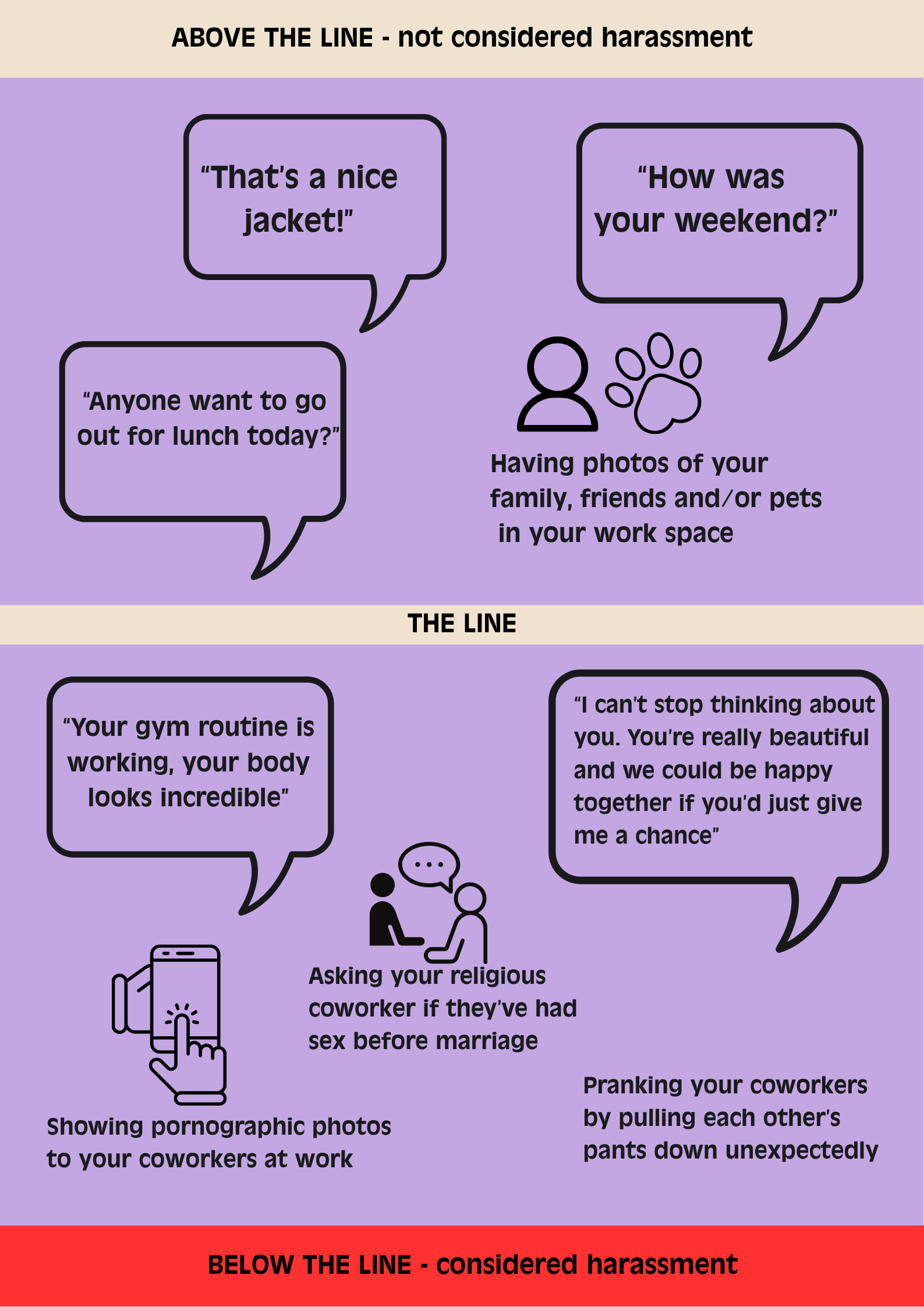
For many workers, particularly women, workplace sexual harassment is a deeply harmful psychosocial hazard. Its impacts are long-lasting, affecting mental health, job satisfaction, and overall wellbeing. But the impact goes beyond the harassment itself.
The widespread use of Non-Disclosure Agreements (NDAs) in workplace sexual harassment cases continues to undermine safety by silencing victim-survivors and protecting perpetrators. Often presented as a standard condition for resolving such claims, these legal contracts can ultimately cause more harm than good.
A Non-Disclosure Agreement (NDA) is a legal contract that requires someone to keep certain information confidential. In workplace sexual harassment cases, NDAs are often used to prevent victim-survivors from speaking about what happened to them—sometimes indefinitely.
While NDAs are presented as standard legal tools to protect privacy and finalise settlements, in practice, they are often misused, shielding employers and perpetrators while isolating victim-survivors. Many workers feel they have no real choice but to sign an NDA to resolve their complaint, secure a settlement, and protect their career.
One in three workers in Australia has experienced sexual harassment in the workplace in the last five years—41% of women, 26% of men, and 67% of non-binary people.[1] This is not a marginal issue. It is Australia’s most widespread workplace safety concern.
Sexual harassment is driven by outdated gender stereotypes and entrenched power imbalances. It happens across all sectors, to people of all ages and backgrounds, and it’s overwhelmingly perpetrated by men (77%). [2]
Workplace sexual harassment causes deep psychological harm. Victim-survivors often experience:[3]
When NDAs prevent people from speaking about their experiences, these harms are exacerbated—isolating workers, inhibiting accountability, and making it harder to heal.
At the Working Women’s Centre SA, we see first-hand the long-term impacts of workplace sexual harassment and NDAs on the careers and lives of workers.
Workplaces have a Positive Duty under the law to proactively prevent sexual harassment—not just respond after harm is done. The routine use of NDAs undermines efforts to create a safe, transparent workplaces.
We are calling on the South Australian Government to restrict and regulate the use of NDAs in workplace sexual harassment matters. NDAs should never be the default.
They should only be used when requested by the victim-survivor, without coercion, and with access to independent legal advice.
NDA reform would:
The Working Women’s Centre SA is campaigning to end the misuse of NDAs and ensure that workers can access justice, healing and the freedom to tell their stories.
[1] [2][3]Source: Time for respect: Fifth national survey on sexual harassment in Australian workplaces, Australian Human Rights Commission, 2022.

This material is designed and intended to provide general information in summary form on legal topics, current at the time of publication, for general informational purposes only. This is not legal advice.
Introduction
This is the Working Women’s Centre SA second instalment of our sexual harassment self-representation toolkit series. Our previous factsheet on ‘Making a Sexual Harassment Complaint to the Australian Human Rights Commission’ can be viewed here.
This factsheet will guide you through making a sexual harassment complaint to Equal Opportunity SA (EOSA). You have 12 months from the date the sexual harassment conduct occurred to make your complaint.
REMINDER: You can only make a sexual harassment complaint in one jurisdiction!
Unsure of whether to make a complaint under federal laws or state (SA) laws? One jurisdiction may be better than the other depending on how much time has passed since the incident, where your employer is located, etc. It is important to get legal advice before making a complaint.
You can either complete the form online or print out a paper version to post or email to EOSA.
There is no fee to make a complaint to EOSA.
Part A – Complainant details (About you)
As you are the person making the complaint, you are the ‘Complainant’.
Insert your details and contact information. You do not need to include your address if you are not comfortable doing so.
Part B – Organisation or individual you are complaining about
The organisation(s) and/or person(s) you are complaining about are called ‘Respondents’ as they will be responding to your complaint. This can be your employer (ie the company or business), individual manager(s) and/or the individual(s) who perpetrated the sexual harassment.
Insert the details of all the Respondents you want to include. For example, Respondent 1 – (Employer details), Respondent 2 – (individual’s details), etc.
Part C – What is your complaint about?
Under ‘When did the alleged event(s) happen?’ insert the date or time period of when the sexual harassment occurred.
Select ‘I have been sexually harassed’ and any other boxes that apply. Being victimised is when a person has been treated unfairly because they made a complaint or tried to make a complaint. If this happened to you, select this box too.
Under ‘Where did these things happen?’ select ‘Employment’.
Under ‘Please tell us what happened, and why you think it is discrimination, sexual harassment or victimisation’ insert relevant details about what happened to you, including dates, names of individuals, locations, etc. Avoid long, complicated paragraphs. It is best to use headings, numbered paragraphs and dot points.
You can also create a separate document to answer this section and attach it to your complaint. If you do this, simply write, ‘Please see attached complaint summary’ under this section.
Include any documents that may support your complaint, including letters from your employer, text messages, screenshots and/or photos which evidence the sexual harassment.
Under ‘What (if anything) have you done to try to resolve your complaint?’ insert relevant details (eg if you made previous complaint(s) within the workplace and their outcome(s)).
Under ‘Have you talked to another organisation about this?’ answer accordingly (eg if you contacted SafeWork SA, the Fair Work Ombudsman, etc.)
Under ‘What effect (financial or personal) did the unfair treatment have on you?’ insert relevant details about how the harassment affected you (eg confidence, self-esteem, financially due to being unable to attend work and/or medical expenses, stress, etc.). Please seek legal advice if you have made or intend to make a workers compensation claim.
Under ‘How do you think this complaint could be resolved?’ insert your preferred outcome(s). This can include: a letter of apology, compensation for financial losses you experienced because of the harassment (eg lost wages, medical expenses), compensation for stress, suffering or humiliation (non-economic loss), an agreement for the Respondent(s) to undergo relevant training or to change their policies and procedures.
Statistical Information
Complete this section to help EOSA gather data about discrimination. Your details will not be made public.
Lodging the complaint
Once your complaint form is finalised and signed and you have all your supporting documents together, you can submit the documents in one of the following ways (online or email is preferable):
Note: If you are making another claim (eg an underpayment claim) against the same employer in the South Australian Employment Tribunal (SAET), then you can apply to have both matters ‘joined’ and dealt together with in SAET. At the time of lodging your EOSA complaint, notify EOSA of your SAET claim and request that your EOSA complaint be joined to the SAET claim and referred to SAET.
After submitting your complaint, you will receive an acknowledgement email from EOSA.
Once accepted, your complaint will then be allocated to a Commissioner or Conciliation Officer. They will contact you about resolving the complaint through a conciliation conference.
A conciliation conference is a confidential meeting between the Complainant (you), the Respondent(s) and a Commissioner or Conciliation Officer from EOSA who will help parties communicate and guide discussion by raising questions and making suggestions to assist the parties in reaching a resolution. The Commissioner or Conciliation Officer is impartial, does not take sides and cannot make any decisions.
Conciliations are conducted ‘without prejudice’, which means nothing that is said in the conciliation can be referred to in future proceedings if the matter does not resolve at conciliation.
Tip: Mark your calendar with the conciliation date
You will receive an email from EOSA with details of the conciliation. This will include the date, time and location. Conciliations can be held online, in-person or over the phone. Typically, they occur via MS Teams.
It is important that you attend the conciliation because if you fail to attend, the Commissioner may see this as a lack of interest in proceeding or a failure to cooperate on your part. As a result, they may decline to recognise your complaint as one to take action on.
Preparing for conciliation
During the conciliation conference
Private session
Before a conciliation begins, you will usually have a private session with the Commissioner or Conciliation Officer so they can check in with you and explain the conciliation process. The Conciliator will then have a private session with the Respondent to do the same with them.
Joint session
Then, there will be a joint session with you, the Respondent and the Commissioner or Conciliation Officer. The Commissioner or Conciliation Officer will ask the Complainant (you) to say a statement explaining your case. Here, you can tell your story and have an opportunity to be heard. You can talk about the effect the sexual harassment had on you. Remember to concentrate on key points and provide relevant information that will support your complaint. Avoid long tangents and unnecessary information.
The Commissioner or Conciliation Officer will then give the Respondent an opportunity to respond. Be respectful and do not interrupt others. If the Respondent says something you disagree with, do not assume the Commissioner or Conciliation Officer agrees with them.
You can ask for a break at any time during this process.
Once the joint session is finished, the conciliation will break into private sessions again.
Private sessions
Then, the Commissioner or Conciliation Officer will have a private session with you. They may comment on the strength and weaknesses of your respective cases. Here, you should put forward your proposal for resolving the complaint.
The Commissioner or Conciliation Officer will then have a private session with the Respondent and hear their response or counteroffer to your proposal to resolve the complaint.
The Commissioner or Conciliation Officer will continue to go between the parties with the aim to reach an agreement and pass messages between the parties.
If you and the Respondent reach an agreement, the Commissioner or Conciliation Officer can assist the parties to draw up a conciliation agreement. This is a legally binding and enforceable contract, so carefully review the terms before signing.
If the conciliation is unsuccessful, and the Commissioner of EOSA is satisfied that the complaint cannot be resolved by conciliation, then the Commissioner will notify you of this decision.
If you would like to pursue the complaint further, you have 3 months from the date of the Commissioner’s decision to reply to the Commissioner and request them to refer your complaint to the South Australian Civil and Administrative Tribunal (SACAT).
You should seek additional legal advice before pursuing your complaint further in SACAT.
Contact the Working Women’s Centre on 08 8410 6499 to organise a legal advice appointment with one of our lawyers.
This material is designed and intended to provide general information in summary form on legal topics, current at the time of publication, for general informational purposes only. This is not legal advice.
If you have been advised that you are eligible to make a sexual harassment complaint to the Australian Human Rights Commission (AHRC), use this toolkit as a guide when filing your complaint.
REMINDER: You have 24 months from the date the sexual harassment conduct occurred to make your complaint.
You can either complete the form online or print out a paper version to post or email to the AHRC.
There is no fee to make a complaint to the AHRC.
Part A – About you, the complainant
As you are the person making the complaint, you are the ‘Complainant’.
Insert your details and contact information. You do not need to include your address if you are not comfortable doing so.
Part B – Who is the complaint about?
The organisation(s) and/or person(s) you are complaining about are called ‘Respondents’ as they will be responding to your complaint. This can be your employer (ie the company or business), individual manager(s) and/or the individual(s) who did the sexual harassment.
Insert the details of all the Respondents you want to include. For example, Respondent 1 – (Employer details), Respondent 2 – (individual’s details), etc.
Part C – What are you complaining about?
Select ‘I have been sexually harassed’. If you have experienced other discrimination, select other boxes that apply (eg if you were also discriminated against because of your race, disability, gender, etc.)
Victimisation is when a person has been treated unfairly because they made a complaint or tried to make a complaint. If this happened to you, select this box too.
Under ‘When did the alleged event(s) happen?’ insert the date or time period of when the sexual harassment occurred. In some cases, the AHRC may accept complaints for events that happened more than 24 months ago. If you are making a complaint more than 24 months later, you will need to explain why there was a delay in making the complaint. For example, if you were fearful of making a complaint, you were not aware of the time period or you were experiencing anxiety, trauma, etc. as a result of the sexual harassment.
Under ‘What happened?’ insert relevant details about what happened to you, including dates, names of individuals, locations, etc. Avoid long, complicated paragraphs. It is best to use headings, numbered paragraphs and dot points.
You can also create a separate document to answer this section and attach it to your complaint. If you do this, simply write, ‘Please see attached complaint summary’ under this section.
Include any documents that may support your complaint, including letters from you employer, text messages, screenshots and/or photos which evidence the sexual harassment.
Under ‘How do you think this complaint could be resolved?’ insert your preferred outcome(s). This can include: a letter of apology, compensation for financial losses you experienced because of the harassment (eg lost wages, medical expenses), compensation for stress, suffering or humiliation (non-economic loss), an agreement for the Respondent(s) to undergo relevant training or to change their policies and procedures.
Part D – Lodging the complaint
Once your complaint form is finalised and you have all your supporting documents together, you can submit the documents in one of the following ways (online or email is preferable):
A few days after submitting your complaint, you will receive an acknowledgement email from the AHRC.
There is currently a delay of at least 6 months for the AHRC to accept complaints. The time delay is usually listed in the acknowledgement email. There is no need to provide additional documents or submissions whilst your complaint is awaiting acceptance.
Once accepted, your complaint will then be allocated to a conciliator or investigator. They will contact you about resolving the complaint through a conciliation conference.
A conciliation conference is a confidential meeting between the Complainant (you), the Respondent(s) and a Conciliator from the AHRC. Conciliators help parties communicate and guide discussion by raising questions and making suggestions to assist the parties in reaching a resolution. The Conciliator is impartial, does not take sides and cannot make any decisions.
Conciliations are conducted ‘without prejudice’, which means nothing that is said in the conciliation can be referred to in future proceedings if the matter does not resolve at conciliation.
Tip: Mark your calendar with the conciliation date
You will receive an email from the AHRC with details of the conciliation. This will include the date, time and location. Conciliations can be held online, in-person or over the phone. Typically, they occur via MS Teams.
It is important that you attend the conciliation as your complaint may be terminated if you fail to do so.
Preparing for conciliation
During the conciliation conference
Private session
Before a conciliation begins, you will usually have a private session with the Conciliator so they can check in with you and explain the conciliation process. The Conciliator will then have a private session with the Respondent to do the same with them.
Joint session
Then, there will be a joint session with you, the Respondent and the Conciliator. The Conciliator will ask the Complainant (you) to say a statement explaining your case. Here, you can tell your story and have an opportunity to be heard. You can talk about the effect the sexual harassment had on you. Remember to concentrate on key points and provide relevant information that will support your complaint. Avoid long tangents and unnecessary information.
The Conciliator will then give the Respondent an opportunity to respond. Be respectful and do not interrupt others. If the Respondent says something you disagree with, do not assume the Conciliator agrees with them.
You can ask for a break at any time during this process.
Once the joint session is finished, the conciliation will break into private sessions again.
Private sessions
Then, the Conciliator will have a private session with you. The Conciliator may comment on the strength and weaknesses of your respective cases. Here, you should put forward your proposal for resolving the complaint.
The Conciliator will then have a private session with the Respondent and hear their response or counteroffer to your proposal to resolve the complaint.
The Conciliator will continue to go between the parties with the aim to reach an agreement and pass messages between the parties.
If you and the Respondent reach an agreement, the Conciliator can assist the parties to draw up a conciliation agreement. This is a legally binding and enforceable contract, so carefully review the terms before signing.
If the complaint cannot be resolved by conciliation and the President of the AHRC is satisfied the complaint cannot be resolved, the complaint will be terminated.
Once terminated, you can take the matter to the Federal Circuit and Family Court of Australia or the Federal Court of Australia. You must make an application to either Court within 60 days of the date your complaint was terminated.
You should seek further legal advice before starting a case in these Courts as the process can be lengthy and costly.
Contact the Working Women’s Centre on 08 8410 6499 to organise a legal advice appointment with one of our lawyers.
This material is designed and intended to provide general information in summary form on legal topics, current at the time of publication, for general informational purposes only. This is not legal advice.
On 5 March 2020 the Sex Discrimination Commissioner, Kate Jenkins, released a report called ‘Respect@Work: Sexual Harassment National Inquiry Report’, in which the Commissioner made 55 Recommendations for the elimination of workplace sexual harassment.
The Anti-Discrimination and Human Rights Legislation (Respect@Work) Bill passed Parliament and received Royal Assent on 12 December 2022. It implemented the remaining Recommendations of the Respect@Work report.
Effective from 13th December 2022, employers have a legislated positive obligation to take reasonable and proportionate measures to eliminate sex discrimination, sexual harassment and victimisation, as far as possible.
The significance of this amendment in terms of liability, is that an employer is now not only vicariously liable under the Sex Discrimination Act 1984 for Sexual Harassment in the workplace, but they now also have a positive obligation to be proactive and take preventative action to stop sexual harassment from occurring in the workplace.
Your obligation as an employer is to ensure the health and safety of your workers. A workplace is a dynamic place where people with different life experiences, different levels of power and responsibilities interact to create what is acceptable and unacceptable behaviour in that space. Because of this, all workplaces need to be continually and actively reviewing and ensuring that the space they are creating is safe and inclusive.
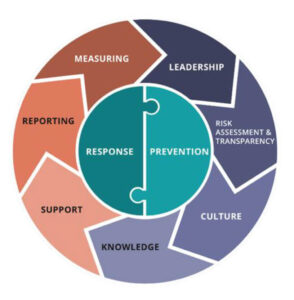
Image courtesy of AHRC.
There are various actions an employer can take to ensure they are meeting their positive duty.
The government has made it clear with these legislative amendments that Australia has a no tolerance policy to sexual harassment in the workplace. This attitude is reflected in the cultural change we have seen in the media and wider communities.
As of 13th December 2022, a person conducting a business or undertaking (PCBU) is exposing themselves to risk of legal action by failing to take preventative measures to prevent sexual harassment. If sexual harassment happens in connection with one of your employees, then you could be faced with one or more of the following outcomes:
As a part of an employer’s positive obligation to prevent sexual harassment, the organisation or business should proactively educate leaders, and other staff members in management, on the recent law reform and new obligations.
Powers of Australian Human Rights Commission
From 13 December 2023, the Australian Human Rights Commission will have regulatory powers to monitor and enforce compliance of this positive duty. These powers include conducting inquiries and applying to the federal courts for orders to be made against businesses.
To protect your workers, lower your liability of legal risk, and protect the reputation of your business, it is essential that you inform yourself of this positive obligation and what is required of you to satisfy this obligation.
The Working Womens Centre SA offers free and fee for service training for workplaces to educate them on their legal obligations under workplace and discrimination legislation. Our goal is to provide workplaces with the practical tools to support their staff through training, policy development and ongoing consultation.
Training Package – Preventing and Addressing Sexual Harassment
This training is for organisations and businesses to increase knowledge of what sexual harassment in the workplace is according to current legislation, including recent amendments that put a positive obligation on employers to prevent sexual harassment.
Employers will learn practical strategies to prevent sexual harassment at work, dealing with sexual harassment and discrimination complaints, and learn how to create a positive workplace culture free from inappropriate behaviours.
We work with you to tailor our packages to suit your specific context/industry and can tailor training for different people with varying responsibilities within your organisation.
This training package covers the following:
For any enquiries or to book a training session today, contact our office of 8410 6499, make an online enquiry, or email us at training@wwc.org.au.
This material is designed and intended to provide general information in summary form on legal topics, current at the time of publication, for general informational purposes only. This is not legal advice.
After much campaigning by Working Womens Centres, unions, feminists, and activists, significant changes have been made to Australia’s workplace laws in relation to sexual harassment as of December 2022.
The Sex Discrimination Commissioner, Kate Jenkins, released a report in 2020 of which the Commissioner made 55 recommendations for the elimination of workplace sexual harassment.
Some notable recommendations which have now been legislated by parliament to form part of Australia’s employment laws are the following:
Positive obligation means that your employer, or person who is conducting a business or undertaking that you work for, has a responsibility to prevent sexual harassment from occurring in the workplace. This is a shift from employers previously only being legally liable on behalf of a sexual harasser, after the sexual harassment has occurred. These new laws means that an employer or person conducting a business or undertaking must be proactive and take preventative action to stop sexual harassment from occurring in the workplace.
This obligation on a person conducting a business or undertaking (PCBU) to prevent sexual harassment extends beyond harassment perpetrated by colleagues and/or management internally. This extends to perpetration externally from customers, sales representatives etc.
A person conducting a business or undertaking (PCBU) has a primary duty of care to ensure, so far as is reasonably practicable, the health and safety of workers. This is a term often used in Work Health and Safety laws. Some PCBU’s are not always employers so the use of both terms captures a wider group of responsible people.
There are many steps your employer can take in order to prevent sexual harassment. This will depend on the size of the business as to what is considered a ‘reasonable step’. Some of those steps are:
Options Before 6 March 2023
If you experience sexual harassment (one or more incidents) before 6 March 2023, you could if comfortable and safe do the following:
For more information about these options please read our fact sheet about sexual harassment in the workplace: https://wwcsa.org.au/resources/sexual-harassment-legal-options/ or give our Centre a call and book an appointment for legal advice.
If you have experienced sexual harassment in connection with your workplace, on 6 March 2023 or after you will be able to lodge a dispute with the Fair Work Commission.
Who can lodge a dispute?
If you are being sexual harassed and you are
and
The first or only incident of sexual harassment occurred on or after 6 March 2023, then you can lodge a dispute in the Fair Work Commission.
Who do you lodge the dispute against?
You can lodge the dispute against the person(s) who sexually harassed you and the employer that you’re both employed by. You can also lodge a claim against a PCBU. It might be that you say your employer and or the PCBU should have prevented the harassment or they did not respond to it well.
Forms
To lodge a dispute, you need to complete the f75 form. and you can find it here https://www.fwc.gov.au/apply-resolve-sexual-harassment-dispute-form-f75. After you lodge a dispute, you will receive a phone call from the Fair Work Commission confirming that they have received your application. At this point, with your consent, your application will be sent to the people and/or employers named in your application.
The perpetrators and employer will have an opportunity to provide a written response to your application. This is also a FWC form, and this response will be sent to the FWC and then it will be sent to you.
Conciliation stage
At this stage, a confidential conciliation conference will be held. The way this conference is conducted will be a matter for the FWC member, however the member will contact you and ask you about your preferences and take care to keep all parties safe. This might mean that you won’t see the employer or perpetrator at the conciliation, and you will be in separate rooms for the entire period. It might mean that the conciliation conference is conducted on the telephone, or it might be that no conciliation conference is listed, and the matter is listed for a hearing. The FWC is taking steps to be victim centric and so your opinion and preference will be considered.
What can you ask for?
At the conciliation stage, you can make settlement offers based on what could be ordered if you were to go to a hearing and win. You can ask for
Hearing
If you dispute does not settle at conciliation, and all parties agree for it to stay at the FWC then your dispute will be listed for a hearing. This means that a member of the FWC will preside over a hearing about your dispute. A hearing will call for witness statements, submissions about how the law works and applies to the facts in your witness statement, and cross examination of both parties’ witnesses.
‘A stop sexual harassment order’ is intended to prevent any future harassment, while an application for the FWC to otherwise deal with the dispute is intended to remedy past harm caused by sexual harassment. You can make both a stop sexual harassment application and lodge a sexual harassment dispute at the same time.
Stop Sexual Harassment Claim
If you are still in employment and the sexual harassment continues, then you can make an Application in the Fair Work Commission (FWC) to ‘Stop Sexual Harassment’. The matter will be listed for a Conciliation where the parties will have the opportunity to negotiate an agreement facilitated by a conciliator.
If this conciliation is unsuccessful and the parties are unable to reach an agreement, there are two avenues to further pursue the claim:
These changes to the Fair Work Act 2009 (Cth) commence on 6 March 2023. It is important to note that conduct that has occurred before 6 March 2023 will not be covered unless the conduct is ongoing.
To file a Stop Sexual Harassment Application in the Fair Work Commission, you need to file a Form F72 in the Fair Work Commission. There is a fee of $77.80 to make this application, however, you can apply for a fee waiver if it would cause financial hardship.
To make a Stop Sexual Harassment Application, you will need to set out the following in your application:
Information on how to make this kind of application can be found on the Fair Work Website at the following links:
The following remedies are available if a matter proceeds to arbitration in the FWC:
A complaint form can be filled out online and submitted on the AHRC website. There is a 24 month timeframe from the date of sexual harassment to make a complaint in the AHRC. You should contact the Working Women’s Centre SA for legal advice on your particular matter.
A complaint form can be filled out online and submitted on the AHRC website. There is a 12-month timeframe from the date of sexual harassment to make a complaint in the EOC. You should contact the Working Women’s Centre SA for legal advice on your particular matter.
This material is designed and intended to provide general information in summary form on legal topics, current at the time of publication, for general informational purposes only. This is not legal advice.
Presented with Jamie Bucirde from Not So Hospitable
In this webinar we discuss the problem of sexual harassment in the hospitality industry, and your rights and legal options if it happens to you.
We discuss problematic normalised behaviours, and what a healthy and safe workplace looks like. We also cover the latest developments in the law, such as the upcoming legislative changes that will place a positive obligation on employers to prevent staff from being sexually harassed.
This webinar was presented on 7 November 2022. Information was current as of that date.
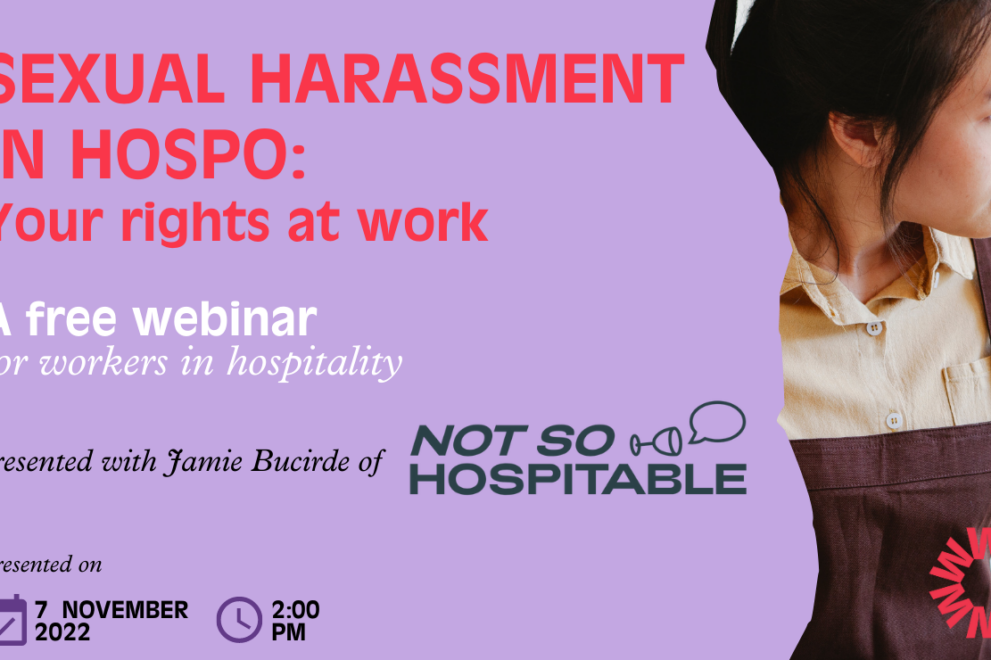
This material is designed and intended to provide general information in summary form on legal topics, current at the time of publication, for general informational purposes only. This is not legal advice.
In this webinar we discuss your fundamental legal rights and protections at work. We cover common issues encountered by LGBTIQA+ employees, how to deal with discrimination or bullying, and your right to a safe workplace.
We also discuss some new initiatives such as gender affirmation leave, and how you can create change at your workplace.
This webinar was presented on 24 November 2022 as part of Adelaide’s Feast Festival. Information was current as of that date.
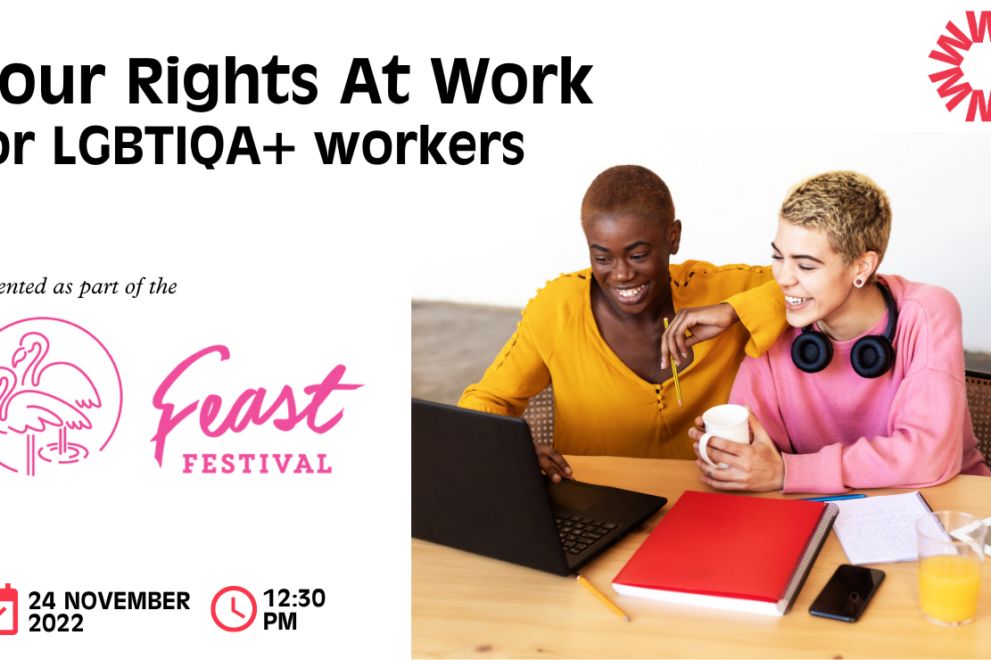
This webinar was presented as part of our 2022 Small Business Webinar Series.
Our Small Business Webinar series was designed around common issues identified by our lawyers in 2022, as a series of bite-sized, easy-to-understand educational sessions to help busy small businesses understand their obligations to their workers.
In this webinar, one of our lawyers, Kylie Porter, along with Jamie Bucirde from Not So Hospitable, discuss your obligations to your workers to prevent and address sexual harassment, and how to create positive culture change in your business.
We discuss problematic normalised behaviours and factors that make a healthy and equitable workplace. We also cover the latest developments in the law, such as the legislative changes that place a positive obligation on you to prevent your staff from being sexually harassed.
This webinar was the first in the Series, and was presented on 7 November 2022. Information was current as of that date.
Please note that this is general information and may not be relevant to your particular matter. This should not be taken as legal advice.
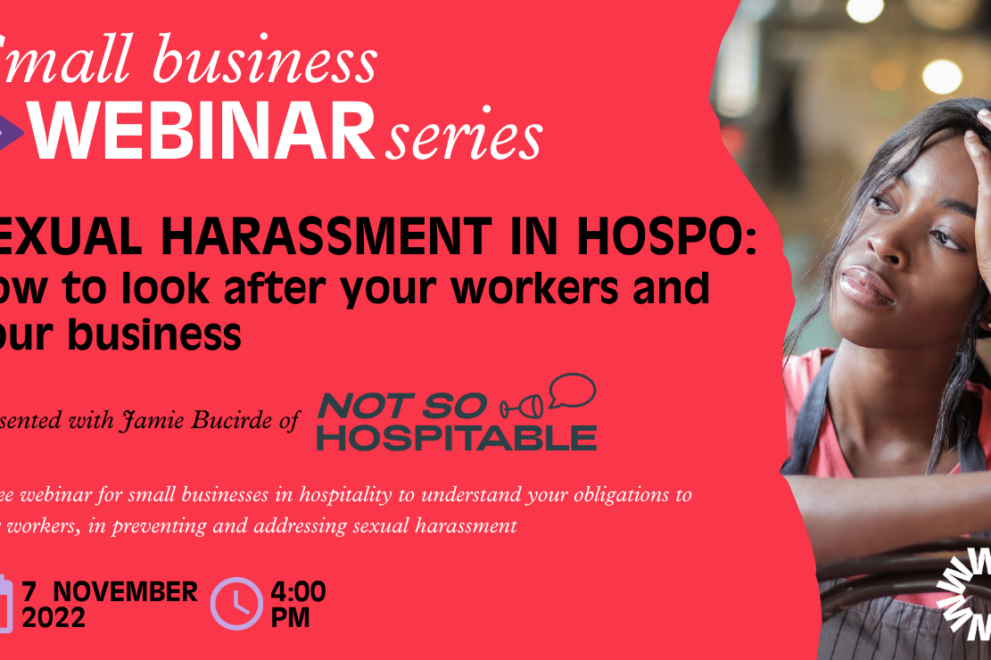
This material is designed and intended to provide general information in summary form on legal topics, current at the time of publication, for general informational purposes only. This is not legal advice.
Please note that this is general information and may not be relevant to your particular matter.
This fact sheet sets out different options for making a formal complaint.
If you have been sexually harassed at work, we encourage you to call us and make an appointment to speak with one of our lawyers.
You are being sexually harassed if you face:
The concept for sexual harassment is broad. However, if you are feeling intimidated, humiliated, or offended by inappropriate sexual conduct in connection with the workplace, this is sexual harassment.[1]
Note: This can include a one-off statement or a profession of love, said to you or written to you.
[1] Sex Discrimination Act 1984 S 28A (1).
You may like to read our summaries of sexual harassment cases that have gone to court, to guide you on possible outcomes for different types of conduct.
There are two different Commissions in which you can lodge a complaint of sexual harassment – the Equal Opportunity Commission deals with complaints under South Australian legislation, and the Human Rights Commission deals with federal legislation.
It is important to seek advice on which Commission best suits your matter. Differences between the two jurisdictions include:
Call us and speak to one of our lawyers to discuss which jurisdiction is best for your particular circumstance. The two Commissions are summarised below.
The Equal Opportunity Commission is the South Australian jurisdiction and handles complaints made under State legislation, being the Equal Opportunity Act 1984 (SA).
You have 12 months to make a sexual harassment complaint in the Equal Opportunity Commission (EOC).[1] This complaint can be made by filling in and filing a form with the EOC.
https://www.equalopportunity.sa.gov.au/complaints/making-a-complaint
Once the EOC receives your complaint, they will assess it to see if it is covered by the Equal Opportunity Act 1984 (SA). They may seek further information from you, or the other party, before accepting or declining your complaint.
If your complaint is accepted, it will be allocated to a Conciliation Officer and will proceed to conciliation.
If it is declined by the Commission, you will receive a letter explaining the decision. Your complaint may be referred to the South Australian Civil and Administrative Tribunal.
For more information, see the Equal Opportunity Commission website:
https://www.equalopportunity.sa.gov.au/complaints/complaint-process
You can seek compensation in this jurisdiction.
You have 24 months to make a claim in the Australian Human Rights Commission (AHRC).[2] The complaint can be made via the online form or by filling in and filing the form below.
https://humanrights.gov.au/complaints/make-complaint
Once you have lodged your complaint, it will be assessed. The other party will receive a copy of your complaint. The Commission will investigate and/or conciliate your complaint.
If your complaint is terminated, you may be able to take your complaint to the Federal Circuit Court or the Federal Court of Australia. The application to the court must be made within 60 days of the date your complaint is terminated.
You can seek compensation in this jurisdiction.
Experiencing sexual harassment in the workplace can often lead to a psychological injury.
Read more about making a claim for worker’s compensation in our separate fact sheet:
Sexual Harassment – should I make a WC claim fact sheet
Your employer has a duty to make sure your workplace is safe. If you are experiencing sexual harassment in your workplace, and this has impacted on your mental health, you can make a complaint. This is known as a Psychological Risk Complaint.
It is important that you document your experiences, as you will need to provide specific details about the incidents that you have experienced in your complaint. This must include the date(s), time(s) and location(s) of the incident(s).
You cannot claim any compensation through this process
In November 2021, changes were made to the Fair Work Act 2009 (Cth) in response to the Respect@Work Report.
These changes were intended to create an accessible, fast moving, cost effective and informal way to address the increasing issue of sexual harassment in the workplace.
The Stop Sexual Harassment Order allows the Fair Work Commission to make an order under s789FC of the Fair Work Act 2009 (Cth).
If you are a worker who is being sexually harassed at work by a colleague, volunteer, or visitor to your workplace, you can make an application to the Fair Work Commission. As the purpose of the order is to prevent future instances of sexual harassment, it is an essential requirement that you are still employed at the time you make the application.
It is also important to note that a Stop Sexual Harassment Order cannot fire or dismiss a sexual harassment perpetrator or award you with any compensation.
To be eligible to make a Stop Sexual Harassment application you must be a worker in a ‘constitutionally covered business’.
To be considered a ‘constitutionally covered business’, the person or corporation must be either:
State public schools, foreign government ministries and some local government employers with incidental trading activities.
Detailed below are the stages to making a Stop Sexual Harassment Order application.
The correct form is Fair Work Commission Form F72. This can be accessed on the Fair Work Commission website.
https://www.fwc.gov.au/form/apply-stop-workplace-bullying-form-f72
A Stop Sexual Harassment Order cannot result in reinstatement or the payment of money (compensation). This course of action is for employees who are being sexually harassed at work and want to continue working, but do so in a safe environment, free from sexual harassment.
At this point the Case Management team will review your application. They will look at whether you’ve completed the application correctly and confirm whether you want to proceed with your application.
At this point the FWC will serve your employer, and the person you have named in the application with your application.
After your application has been served on your employer your matter will be allocated to a conciliation.
At this stage you and your employer will negotiate an outcome that you desire to continue your employment in a safe environment, free from sexual harassment.
If you resolve your matter at this stage, and there is no need to continue with a Stop Sexual Harassment Order, your matter will be considered resolved and it will discontinue.
If your matter is not resolved at conciliation, it will be assigned to a Member of the Commission for a conference. At this stage there will be an opportunity to negotiate to resolve the matter.
If the matter is not resolved at the conference stage, it will go to a hearing.
The hearing stage is more formal. It will give you and the other party the opportunity to present evidence on the matter.
The hearing will result with either your application being dismissed, or your application being determined.
A Stop Sexual Harassment Order will either be made, or the Commission will decline to make an order.
You can appeal this decision by leave of Full Bench.
You cannot claim any compensation through this process.
The Government has now legislated recommendations put forward in The Respect@Work Report. This report was based on a national inquiry into sexual harassment in Australian workplaces.
The Fair Work Act has been amended to include a prohibition on sexual harassment in connection with work. It increases protections for workers, including employees, work experience students, volunteers, future workers and anyone conducting a business or undertaking in the workplace. The protection won’t apply to sexual harassment of a worker that starts before 6 March 2023.
There is now also a positive duty on employers to prevent sexual harassment. A person or company will be liable for sexual harassment committed by one of their employees, or agents, unless they can prove that they took all reasonable steps to prevent it. You will also be able to make a joint application with other workers, for example, if one person at your workplace has harassed both you and your co-workers.
These changes include a new dispute resolution process which will allow the Fair Work Commission to deal with disputes through conciliation or mediation. If a dispute cannot be resolved, and the parties consent, the Commission can settle the dispute and make orders, including orders for compensation.
If the dispute cannot be resolved by the Commission, you will be able to pursue civil proceedings through to the Federal Court or Federal Circuit and Family Court of Australia, within 60 days of the Fair Work Commission issuing a certificate confirming that your matter has not been resolved.
These changes mean that you have the option to pursue a complaint of sexual harassment through the Fair Work Commission, as well as the AHRC and EOC jurisdictions. You also still have the existing option to pursue the Stop Sexual Harassment Order in the Fair Work Commission.
These new powers of the Fair Work Commission will come into effect on 6 March 2023.
[1] Equal Opportunity Act 1984 (SA) s 93(2).
[2] Australian Human Rights Commission Act 1986 (Cth) s 46PH.
[3] Sex Discrimination Act 1984 S 28A (1).
[4] Fair Work Act 2009 (Cth) s 789FC.
[5] Fair Work Commission, Orders to Stop Sexual Harassment Bench book, 11 October 2021, p 35
This material is designed and intended to provide general information in summary form on legal topics, current at the time of publication, for general informational purposes only. This is not legal advice.
When you are experiencing bullying, harassment or discrimination at work over a period of time, it can be difficult to keep track of exactly what happened and when, especially if your mental health is suffering. It helps to keep timely records of it all, so you don’t forget the details of what happened.
Your notes can be useful later if you wish to complain about the behaviour to your manager or HR person. It will also be good evidence to support a legal claim such as worker’s compensation, a Stop Bullying Order, or a complaint of sexual harassment in the Equal Opportunity Commission or Australian Human Rights Commission.
If you have experienced bullying or harassment during your work day (or night), take a moment to record what happened when you get home, or as soon as you can. You can send yourself an email or a text, or write it down with pen and paper in a diary.
Include as much detail as you can, especially the “who, what, where and when”. Include anyone who witnessed the behaviour, or anyone you spoke to about it. A structure is below to help you record all the important information.
Remember to keep a copy of any emails, texts, photos, or other records, that might be relevant to the harassment too.
Diary entry: 7 June 2022, 1:30am
Date of incident: 6 June 2022
Time: approx. 4pm
Place: In the storeroom at work
Who was there? Me, Josh, Maya and Mark the head chef
What happened? I was getting flour out the storeroom to start dinner prep and Chef came in, he said “just need some salt”. I don’t think he did, this is about the third time in the past couple of weeks he has made an excuse to go into the storeroom when I am in there. He brushed past me to the furthest shelf and put his hand on my waist as he went past, and whispered “it’s cosy in here isn’t it” in a sleazy way in my ear. I walked out and Josh could tell I was upset. He asked what happened but I didn’t want to say anything in case Chef heard. Maya was on shift tonight too, I told her what happened on our break at 9pm.
If you need advice about workplace bullying or sexual harassment, call your union or our Centre.
You might like to check out our other fact sheets on sexual harassment at work:
Young workers and sexual harassment – what are my rights?
Sexual Harassment at Work – Should you make a Workers Compensation claim?
Join one of our lawyers, Kylie Porter, along with Jamie Bucirde from Not So Hospitable, as we discuss the problem of sexual harassment in the hospitality industry, and your rights and legal options if it happens to you.
We will discuss problematic normalised behaviours, and what a healthy and safe workplace looks like. We will also cover the latest developments in the law, such as the upcoming legislative changes that will place a positive obligation on employers to prevent staff from being sexually harassed.
Both current and former hospo workers are welcome, as are all other interested supporters of workers in the hospitality industry.
Register now by clicking the button on the left, or by visiting this link.
Note: If you can’t attend at this time, please register and we will send you a recording of the session.
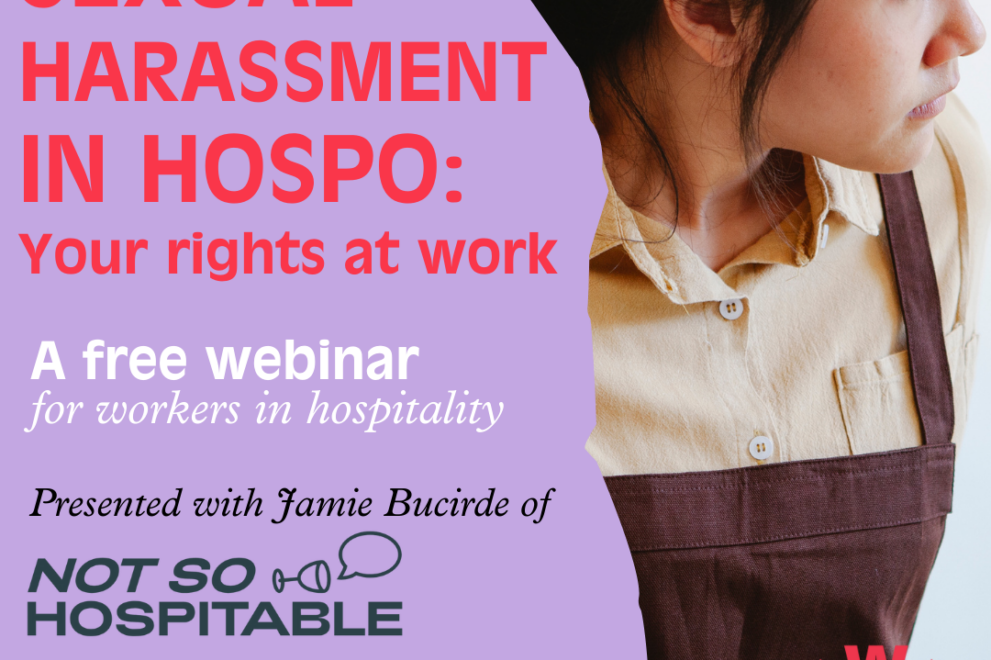
Our 1-hour CPD workshop is tailored for practitioners in the legal sector to equip teams with the tools to respond to workplace sexual harassment. The content shines a light on the current climate within the legal sector and how the working rights of practitioners are breached when harassment and bystander apathy occurs. Participants will learn practical strategies to prevent sexual harassment and how to create a positive workplace culture, free from inappropriate behaviours.
The Working Women’s Centre workplace training program is an evidenced based, comprehensive approach to understanding issues in the workplace for legal practitioners. Our training programs are delivered by a masters qualified education and training specialist with expertise in workplace relations and gendered violence.
We acknowledge that this event will be streamed on Kaurna land and we pay our respects to the traditional custodians of the land, past and present. Sovereignty was never ceded.
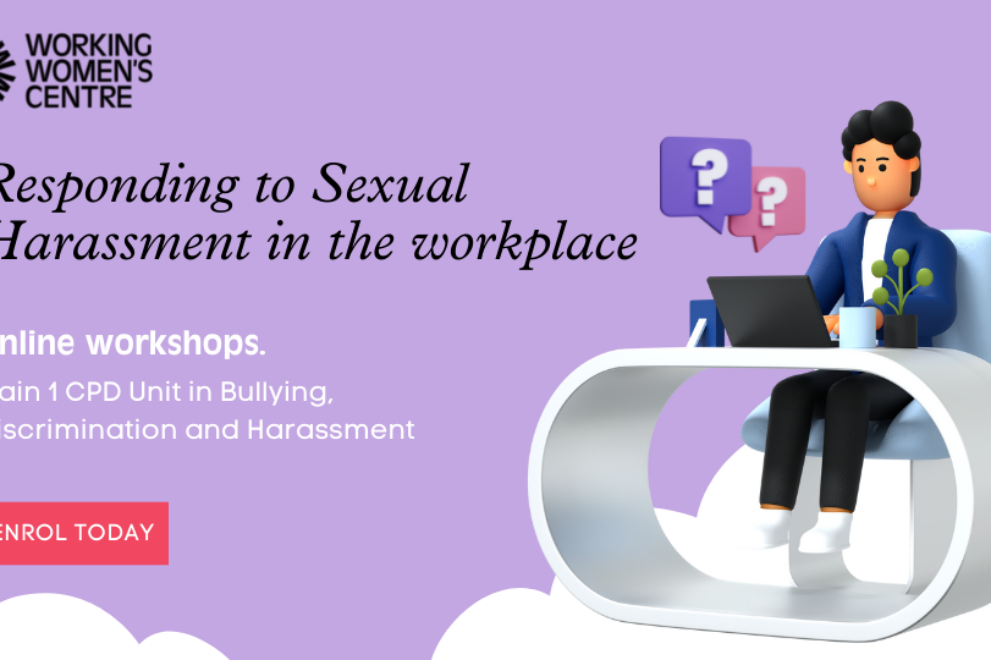
Our 1-hour CPD workshop is tailored for practitioners in the legal sector to equip teams with the tools to respond to workplace sexual harassment. The content shines a light on the current climate within the legal sector and how the working rights of practitioners are breached when harassment and bystander apathy occurs. Participants will learn practical strategies to prevent sexual harassment and how to create a positive workplace culture, free from inappropriate behaviours.
The Working Women’s Centre workplace training program is an evidenced based, comprehensive approach to understanding issues in the workplace for legal practitioners. Our training programs are delivered by a masters qualified education and training specialist with expertise in workplace relations and gendered violence.
We acknowledge that this event will be streamed on Kaurna land and we pay our respects to the traditional custodians of the land, past and present. Sovereignty was never ceded.

Our 1-hour CPD workshop is tailored for practitioners in the legal sector to equip teams with the tools to respond to workplace sexual harassment. The content shines a light on the current climate within the legal sector and how the working rights of practitioners are breached when harassment and bystander apathy occurs. Participants will learn practical strategies to prevent sexual harassment and how to create a positive workplace culture, free from inappropriate behaviours.
The Working Women’s Centre workplace training program is an evidenced based, comprehensive approach to understanding issues in the workplace for legal practitioners. Our training programs are delivered by a masters qualified education and training specialist with expertise in workplace relations and gendered violence.
We acknowledge that this event will be streamed on Kaurna land and we pay our respects to the traditional custodians of the land, past and present. Sovereignty was never ceded.

Our 1-hour CPD workshop is tailored for practitioners in the legal sector to equip teams with the tools to respond to workplace sexual harassment. The content shines a light on the current climate within the legal sector and how the working rights of practitioners are breached when harassment and bystander apathy occurs. Participants will learn practical strategies to prevent sexual harassment and how to create a positive workplace culture, free from inappropriate behaviours.
The Working Women’s Centre workplace training program is an evidenced based, comprehensive approach to understanding issues in the workplace for legal practitioners. Our training programs are delivered by a masters qualified education and training specialist with expertise in workplace relations and gendered violence.
We acknowledge that this event will be streamed on Kaurna land and we pay our respects to the traditional custodians of the land, past and present. Sovereignty was never ceded.

This material is designed and intended to provide general information in summary form on legal topics, current at the time of publication, for general informational purposes only. This is not legal advice.
Can you really report instances of sexual harassment in your workplace when you risk losing your job? How does job security help to protect workers from sexual harassment and gendered violence?
Listen to: The Protective Power of Job Security. Our guest speakers will discuss how violence against women is linked to casualisation and how we can prevent violence by increasing access to job security.
Senator Sarah Hanson-Young: Senator for South Australia.
Tanya Hosch: 2021 South Australian of the Year, and the Executive General Manager of Inclusion and Social Policy at the AFL.
Gemma Beale: Writer and a PhD Candidate at Flinders University, with a focus on insecure work and a passion for economic justice.
This event is possible due to a grant from the Government of South Australia, Department of Human Services, as part of the COVID-19 National Partnership – Domestic Violence Funding.
We acknowledge that this event will be held on Kaurna land and we pay our respect to the traditional custodians of the land, past and present. Sovereignty was never ceded.
CONTENT NOTE: this event will involve a discussion on sexual harassment, domestic and family violence and sexual assault.
The Respect@Work Report (2020) outlines that 1 in 3 Australians have experienced sexual harassment at work, ranging from serious offences like sexual assault and rape to inappropriate comments and sexist slurs.
At the Working Women’s Centre, our staff regularly provide advice and support for workers who have experienced workplace sexual harassment. Many of these workers are working in insecure jobs, such as casual or fixed-term contracts.
Our staff have observed that workers are often unable to resist or report sexual harassment due to the risk of losing their job. Gender inequality is proven to be the most significant driver of violence against women and workplace sexual harassment. We have the opportunity to prevent violence by collectively working to increase access to job security.
The Working Women’s Centre is proud to hold a panel event about job insecurity and its connection with gendered violence. In this event, we will hear from three fantastic speakers, each sharing their personal experience and expertise on the topic. The event is also the launch of a new project to improve job security as a protective factor against violence.
Can you really report instances of sexual harassment in your workplace when you risk losing your job? How does job security help to protect workers from sexual harassment and gendered violence?
Come along to our upcoming panel event about The Protective Power of Job Security. Our guest speakers will discuss how violence against women is linked to casualisation and how we can prevent violence by increasing access to job security.
Senator Sarah Hanson-Young: Senator for South Australia.
Tanya Hosch: 2021 South Australian of the Year, and the Executive General Manager of Inclusion and Social Policy at the AFL.
Gemma Beale: Writer and a PhD Candidate at Flinders University, with a focus on insecure work and a passion for economic justice.
The panel discussion will go until 7.30, after which attendees are invited to stick around to chat. Drinks will be available for purchase.
This event is possible due to a grant from the Government of South Australia, Department of Human Services, as part of the COVID-19 National Partnership – Domestic Violence Funding.
We acknowledge that this event will be held on Kaurna land and we pay our respect to the traditional custodians of the land, past and present. Sovereignty was never ceded.
CONTENT NOTE: this event will involve a discussion on sexual harassment, domestic and family violence and sexual assault.
The Respect@Work Report (2020) outlines that 1 in 3 Australians have experienced sexual harassment at work, ranging from serious offences like sexual assault and rape, to inappropriate comments and sexist slurs.
At the Working Women’s Centre, our staff regularly provide advice and support for workers who have experienced workplace sexual harassment. Many of these workers are working in insecure jobs, such as casual or fixed-term contracts.
Our staff have observed that workers are often unable to resist or report sexual harassment due to the risk of losing their job. Gender inequality is proven to be the most significant driver of violence against women and workplace sexual harassment. We have the opportunity to prevent violence by collectively working to increase access to job security.
The Working Women’s Centre is proud to hold a panel event about job insecurity and its connection with gendered violence. In this event, we well hear from three fantastic speakers, each sharing their personal experience and expertise on the topic. The event is also the launch of a new project to improve job security as a protective factor against violence.
We hope to see you there!

This material is designed and intended to provide general information in summary form on legal topics, current at the time of publication, for general informational purposes only. This is not legal advice.
Sexual harassment in the workplace is an ongoing and increasingly publicised topic. More and more women contact our centre daily to seek advice in relation to the legal avenues that may be available to them to seek a remedy for the unacceptable and intolerable behaviour they have experienced in the workplace.
Once a victim has gained the courage to seek advice on their legal options, the next question that usually follows is how does someone quantify a monetary settlement for the behaviours and conduct that person has been subject to?
The following case studies are based on leading sexual harassment cases. They give a brief summary of the facts by looking at the conduct and behaviours a complainant has experienced, the findings of the court in relation to the said conduct and lastly the rulings and compensation awarded by the courts.

Ms Hill was awarded $170,000 in compensation for loss and damages.
Facts:
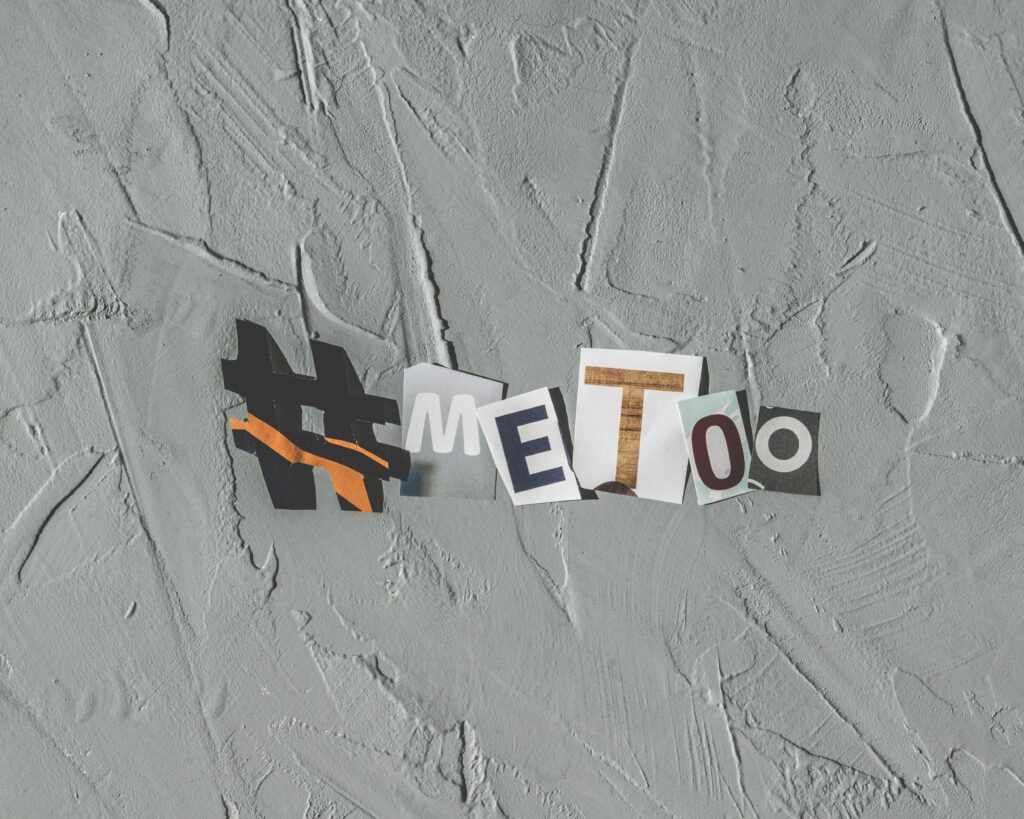
Ms Evans was awarded $30,000 in damages.
Ms Evans also claimed that Pasadena Foodland had breached its duty of vicarious liability and was responsible for Mr Crugnale’s behaviour because they had failed to appropriately implement/enforce their own sexual harassment policy.
Pasadena Foodland was found to be vicariously liable for Mr Crugnale’s conduct as they did not take reasonable steps to prevent Mr Cugnale’s behaviour. In was also found that Foodland failed to implement their own sexual harassment policy.
http://www.austlii.edu.au/cgi-bin/viewdoc/au/cases/sa/SAET/2019/222.html

MS YELDA RECEIVED $200,000 IN COMPENSATION.

Ms Lee was awarded $100,000 in damages
Have you experienced:
• Wage theft? Do you think you may not be being paid correctly?
• Unfair dismissal? Have you been dismissed from a job recently?
• Discrimination? Have you been treated badly at work due to race, gender or age?
• Sexual harassment?
• Bullying?
• Sham contracting? Does your employer call you a contractor, however you may be an employee?
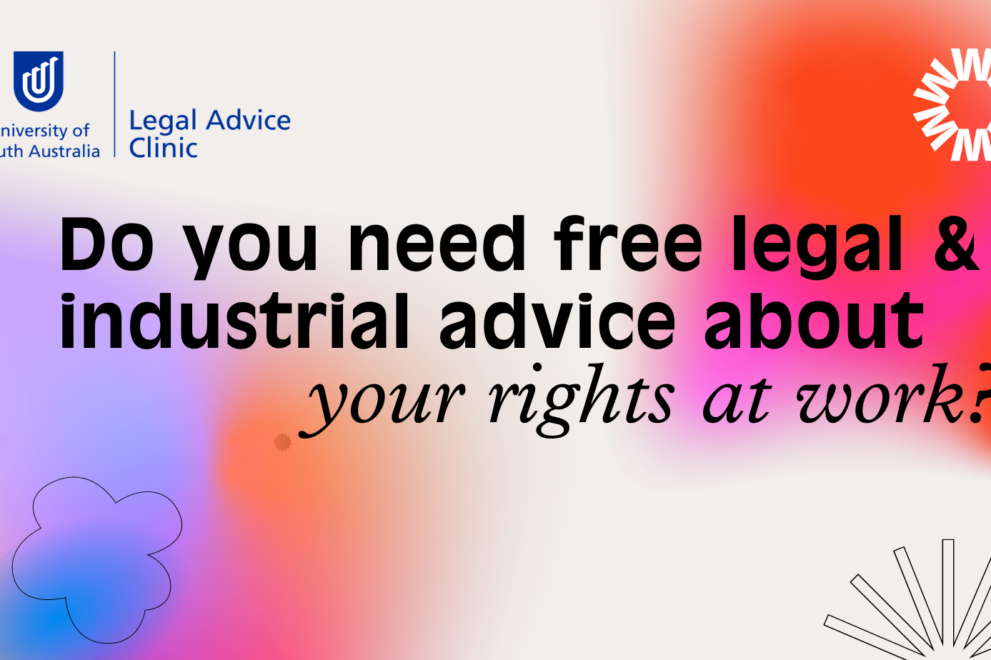
The Working Women’s Centre in collaboration with Fair Go SA, will co-host an educational workshop on worker’s rights and the Fair Work Act.
This will be followed by a confidential (one to one) advice clinic for any workers who need free industrial advice about work.
Our workshop will cover topics including:
At the Confidential Industrial Advice Clinic you can:
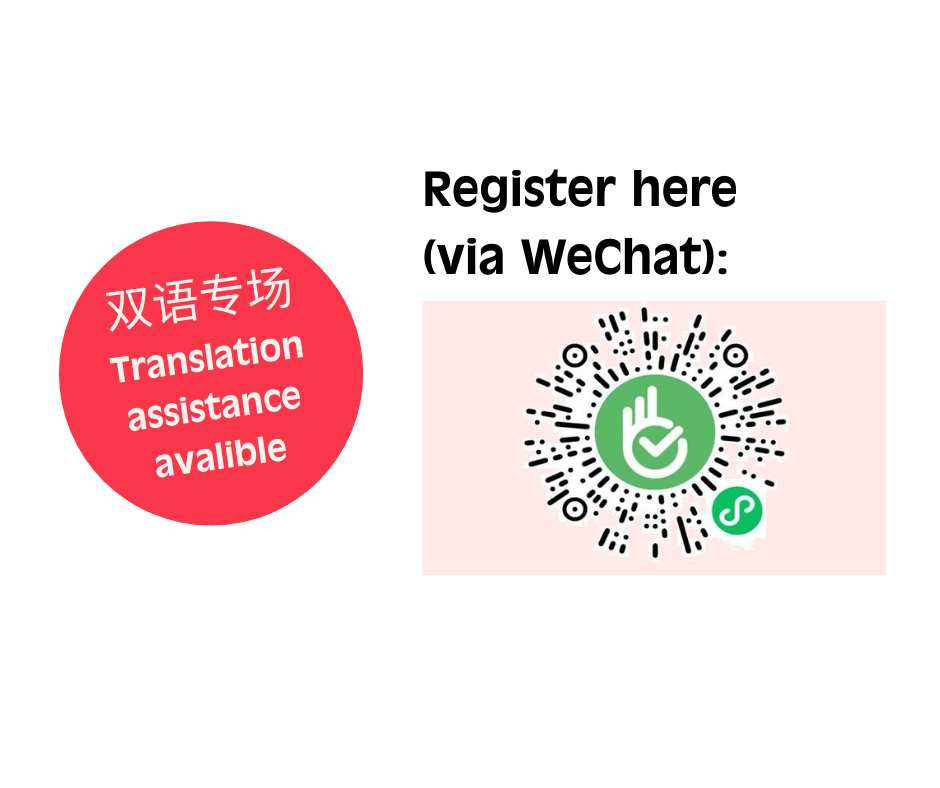
If you cannot register for this event via the We Chat QR code, please email to register: meng@wwc.org.au
Accessibility: Please note that this venue is not wheelchair accessible, there are volunteers who can assist with accessing the venue if required, but only upon request.
We acknowledge that this event is on Kaurna land and we pay our respect to the traditional custodians of the land, past and present. Sovereignty was never ceded.

Note: this event will be held online due to COVID-19 risks and restrictions.
Come along to our Feminist Action Session to help the Working Women’s Centre develop practical tools that can be used in workplaces.
1 in 3 Australians have experienced sexual harassment at work, yet only 18% of victims report their experience (according to the Respect@Work Report 2020).
The Working Women’s Centre SA has recently completed research that found that workplace posters are effective and engaging tools to highlight inappropriate behaviour and connect victims with support avenues. In the upcoming Feminist Action session, we will discuss ways in which we can combat sexual harassment in our workplaces and communities and support victims of sexual harassment. We’ll also share ideas for a meaningful poster for South Australian workplaces.
In this session you will have the opportunity to share your ideas and discuss the topic with like-minded individuals.
CONTENT NOTE: This event will involve a discussion of workplace sexual violence.
We acknowledge that this event is on Kaurna land and we pay our respect to the traditional custodians of the land, past and present . Sovereignty was never ceded.
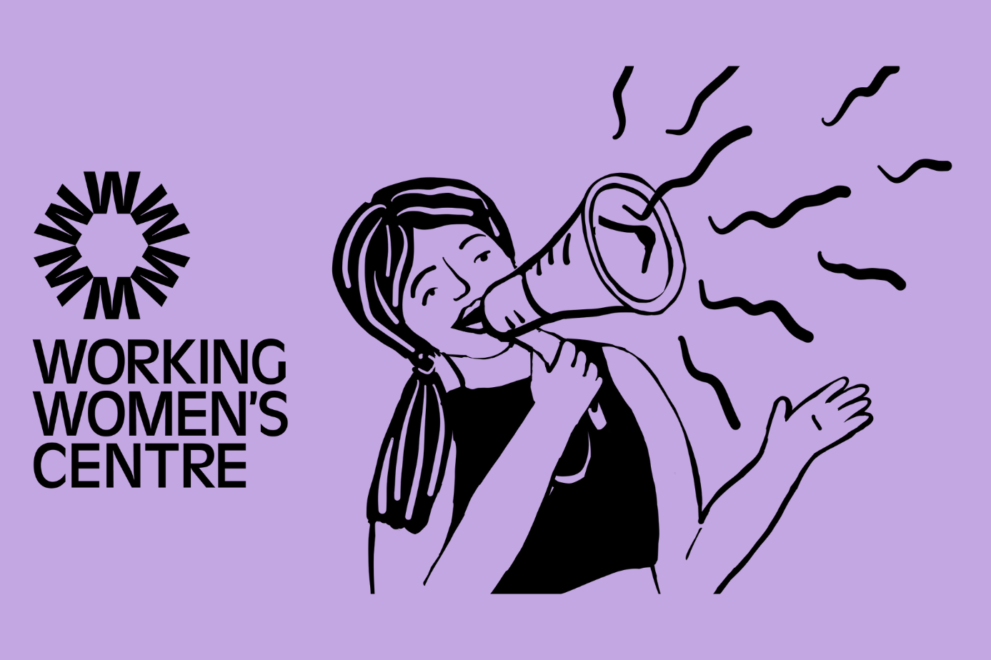
This material is designed and intended to provide general information in summary form on legal topics, current at the time of publication, for general informational purposes only. This is not legal advice.
Sexual harassment is conduct of a sexual nature that makes you feel offended, humiliated or intimidated, that a reasonable person would anticipate would make you feel that way.
Sexual harassment includes conduct like:
Your workplace should protect you from sexual harassment at work. This includes from co-workers, customers or clients. When starting a job, you should ask your employer about their workplace harassment policies. If you foresee any risks, for example, you are worried about being rostered on alone in a shop, discuss with your employer what can be done to ensure your safety at all times.
If you tell your employer that you have been sexually harassed, or they should have known that it was happening, they must stop the harassment and prevent it happening again. They are also vicariously responsible for the conduct of their staff (that is, legally responsible for their behaviour) unless they show that they have taken reasonable precautions to prevent sexual harassment and to properly deal with any complaints.
If you complain about sexual harassment, and then you have your shifts cut, or you are demoted or fired, you should call us for advice. You have a right to safe workplace and if you suffer a loss for making a complaint about that right, you could make a General Protections claim in the Fair Work Commission. Note that if you are fired, there are only 21 days from the end of your employment to make this claim.
You can also make a complaint to the Equal Opportunity Commission and Australian Human Rights Commission about the sexual harassment. There time limits of 12 months and 24 months respectively for these claims.
If you have been sexually harassed at work, firstly make sure you are safe and have support, and call us or your Union for legal advice about your individual situation.
Here are some common situations. Have a read and think about what you would do in these situations.
Even if a workplace has a culture of jokes and pranks, Mark’s jokes and comments are sexual harassment. Unwelcome touching, such as a shoulder rub, is also sexual harassment.
If Olivia feels too anxious or unwell to attend work, she should seek help from her doctor and with her doctor’s support, consider a worker’s compensation claim.
Olivia could see if any of her co-workers feel the same way about Mark’s behaviour and complain as a team. Olivia could arrange a meeting with Mark about his behaviour, with a support person, or could write an email to him outlining her concerns. If the workplace has a policy on workplace harassment, she should refer to it. Olivia has the right to a workplace free of sexual harassment and her concerns should be taken seriously. Once the workplace is notified of her complaint, they should take steps to prevent it happening again, even if the boss is the culprit.
Olivia could also lodge a claim in the Equal Opportunity Commission or the Australian Human Rights Commission about the sexual harassment.
If you are in a similar situation, call us or your Union for advice.
It is not okay that Anika feels unsafe at work. She has the right to a safe workplace. Anika should report the customer’s behaviour to her boss. If her boss knows about the harassment, he must act to stop it and prevent it from happening again. It doesn’t matter if the customer is a regular, a big spender or a friend of the boss.
Anika should put her complaint to her boss in writing, and keep a diary of when the customer harasses her. If at any time, Anika feels physically unsafe, she should seek immediate help. If Anika’s boss fails to do anything to stop the harassment, she could also lodge a complaint in the Equal Opportunity Commission or the Australian Human Rights Commission.
Even though this was a one-off event, it is still harassment. If Trina feels comfortable to do so, she could approach her co-worker and tell him that his behaviour made her feel uncomfortable.
If Trina doesn’t want to speak to her co-worker personally, she could approach her manager or HR department to report the behaviour.
If Trina chooses not to do anything at this stage, she should make a note of the time and date of the harassment and keep a diary if anything further happens, in case she wishes to take action in the future.
Even if you have had a previous relationship with someone at work, you do not have to put up with sexual harassment from that person. You may decide to try to speak to the person harassing you and explain that it is not appropriate in the workplace. If you don’t feel comfortable doing this, or if they won’t stop, you should report the harassment to your boss. Your boss should take your complaint seriously and take steps to prevent it from happening again.
Paige could make a complaint to the Equal Opportunity Commission or the Australian Human Rights Commission about the harassment. If her boss cuts her shifts instead of addressing Tom’s behaviour, she could make a General Protections claim in the Fair Work Commission.
If you have been sexually harassed at work, firstly make sure you are safe and have support, and call us or your Union for legal advice about your situation.
How can the Working Women’s Centre Help?
We can:
Where else can I go for help?
Other organisations that may be able to help include your union, the Australian Human Rights Commission and the Equal Opportunity Commission.
If you are not already a member of a union, ring SA Unions on (08) 8279 2222 to find out which union to join.
Australian Human Rights Commission: The Respect@Work Portal has resources for both employees and employers. Phone: 1300 369 711 Web: www.humanrights.gov.au
Equal Opportunity Commission: Phone: (08) 8207 1977 Web: www.eoc.sa.gov.au
Making a Sexual Harassment complaint is a serious matter.
Other service providers
If your life or someone else’s life is in immediate danger, phone 000 (triple zero).
This material is designed and intended to provide general information in summary form on legal topics, current at the time of publication, for general informational purposes only. This is not legal advice.
When applying for a new job it is important to understand exactly what type of employment relationship you may be entering. There can be serious legal consequences if the employment relationship is incorrectly labelled. For example, some job advertisements might state the position available is for an independent contractor when the true nature of the position is really an employee. Independent contractors and employees have different obligations and rights in relation to the work they perform. It is important to know the difference between the two so you can ensure you are receiving all your legal entitlements and that you are complying with any legal obligations.
There are a number of factors that assist in determining the difference between an employee and an independent contractor. In general:
Independent Contractors work for themselves and are their own boss. They set their own fee for the work that they perform and have control of when and how they work. They usually create and supply invoices to receive payment for their work based on the completion of a job. Independent contractors arrange and pay their own taxation and are required to have an Australian Business Number (ABN).
Employees work for someone else and are not running their own business. The employer controls how, where, and when the employee does their work. Employees are often paid by the hour and receive a wage or salary. Employees are not required to pay their own taxation and their employer will deduct taxation and pay it to the Australian Taxation Office (ATO). Employees are entitled to certain types of leave (i.e. long service and parental leave) and superannuation.
Sometimes the true nature of the relationship will be obvious but sometimes a more fulsome analysis of all the circumstances of the working relationship is required.
It is important to note that no single indicator can determine if a person is a contractor or an employee. Each assessment is based on the individual circumstances of the work arrangement in place. Courts always look at the totality of the relationship between the parties when determining the status of a person’s working relationship.
Sham contracting is where a person working as an employee is told they are an independent contractor when they are not. They may be treated like an independent contractor in some ways, for example they may be required to have an ABN, yet have no control over when and how they do their work or how much they get paid.
It is illegal for employers to misrepresent an employee as an independent contractor. Sham contracting is against the law and there are protections for workers who find themselves in sham arrangements.
For example, it is unlawful for an employer to:
Sham contracting is sometimes done on purpose or an employer may have acted carelessly and not fully understood their obligations at law. Sham arrangements are sometimes set up by employers who are trying to avoid responsibility for paying legal entitlements due to employees such as annual leave or superannuation.
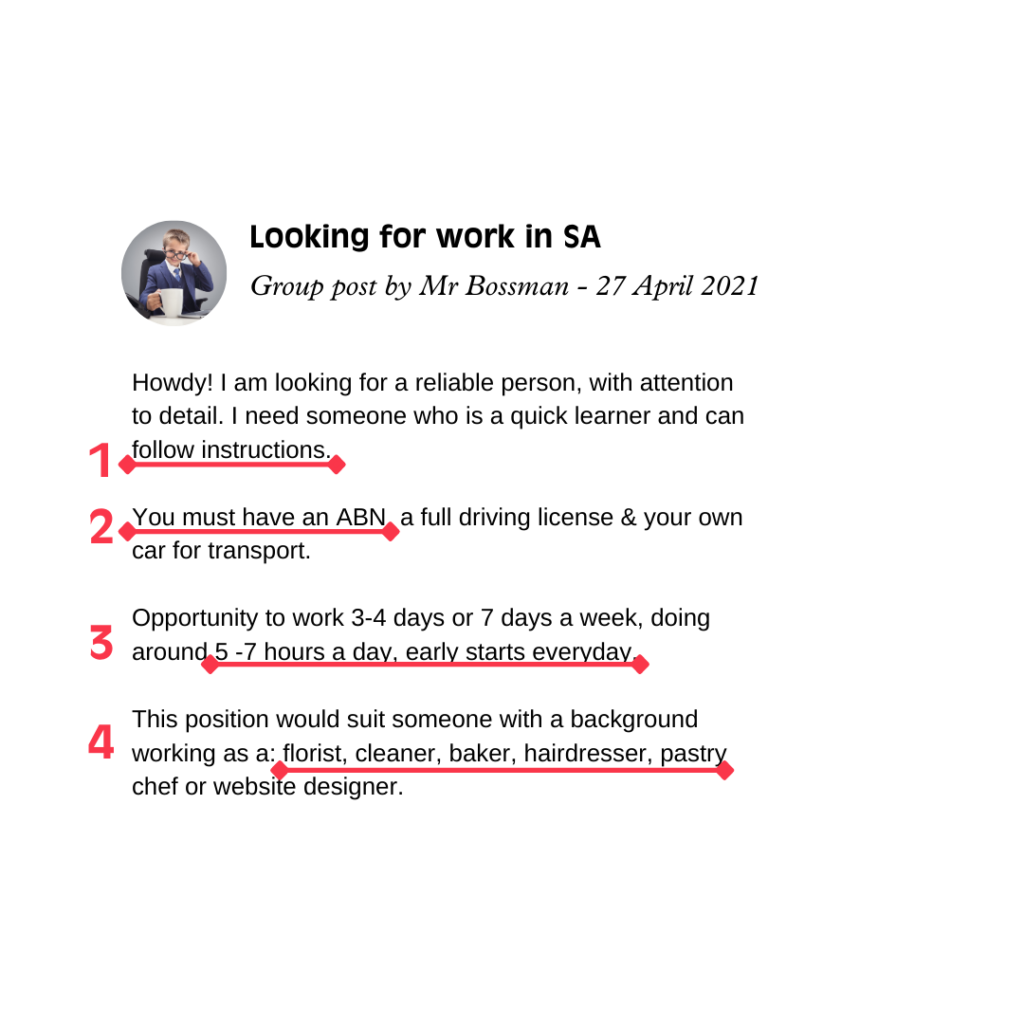
It is unlawful for an employer to pretend that they are offering a person a job as an independent contractor when the position actually involves entering into an employment contract. Before accepting a position like this, you should ask more questions about the true nature of the position and get some advice.
Have a read through these case studies for further guidance on how to spot a sham contracting arrangement:
Stevie was offered a job in a beauty salon as a Beauty Therapist. Stevie is qualified to provide a full range of beauty treatments. Stevie was told she needed an ABN and would need to arrange to pay her own tax. Stevie was told she would be paid $25 per hour and would be given four shifts per week. Her shift times were in line with the salon’s opening hours which were 9am to 5:30pm. She was given a uniform with the Beauty Salon’s logo which she was required to wear. Stevie was told to book and perform nail treatments only. The beauty salon owner told her she would need to bring in her own customers and generate patronage.
Stevie is an employee. She has no control over where, when and how she worked. Even though she was told she needed an ABN and was required to pay her own tax, she was not running her own business and had no control over her work. Stevie may be entitled to a higher rate or pay and superannuation.
Asma is an Electrician and performs work on a residential building site for a large building company called BuildPro. BuildPro engages Asma to wire the new house they have built. Asma gives Buildpro a quote for the job and says she will invoice BuildPro when the work is complete. BuildPro asks Asma to finish the job in three months. The job is too big for Asma to complete alone so she engages another worker to do the job with her. Asma has an ABN and has undertaken to work six days per week from 7am to 3pm to get the job finished.
Asma is an independent contractor. She determined her fee for the work and invoiced BuildPro accordingly. Although BuildPro requested the work be done within three months, Asma was able to determine her hours of work and was able to employ someone else to delegate work to. Asma is running her own business and had control over many aspects of the job which all indicate she was an independent contractor.
This material is designed and intended to provide general information in summary form on legal topics, current at the time of publication, for general informational purposes only. This is not legal advice.
Who is an arts worker?
The term “arts workers” encompasses a hugely diverse range of workers. People working in the arts may be visual artists, they may work in the literary arts or the performing arts of dance, music, and theatre. There are even more types of workers when you consider all the roles supporting the arts including arts administration, production crews, ticket sellers, ushers, spruikers, and festival workers. The length of the list of arts workers is only confined to the limits of human creativity.
Working out your rights and entitlements in the arts can therefore be like finding your way in a labyrinth. Because of the diversity in the nature of work performed, there are many workplace laws that govern working in the arts.
Here are some questions and answers to common issues for arts workers.
Am I an employee?
Workers in the arts are commonly engaged as either employees or independent contractors. It is important to understand the nature of your engagement as a worker because there are different legal rights and obligations depending on the working relationship. For example, some workers are entitled to minimum rates of pay and leave, while others set their own pay and must organise their own leave arrangements.
How can you tell which is which?
Employees work in someone else’s business. The employer controls how, where and when they do their work, and pays them a wage or salary. Employees are entitled to superannuation and they have payroll tax deducted from their pay by their employer. Most employees are entitlement to minimum wages and conditions from an award.
Examples: Full-time arts administration worker, an usher at a theatre, casual sound engineer at a theatre company, or a food and beverage attendant in an outdoor bar at a festival or event.
Independent Contractors work for themselves and are their own boss. They are free to set their own fee for the work that they perform and have control of when and how they work. They should have an ABN, invoice for their work, and organise payment of their own taxation. They may invoice for completion of a job rather by the hour. There is no minimum rate an independent contractor can rely on, rather they set their rates according to the free-market.
Examples: a visual artist engaged to paint and complete two large murals, or a musician playing a three hour set at a particular event.
Sometimes the true nature of the relationship will be obvious but sometimes a more fulsome analysis of all the circumstances of the working relationship is required. There are a full range of factors to be considered in determining whether a worker is an employee or an independent contractor.
Some employers treat their workers as independent contractors when they are really employees. For example, the employer might require the workers to have an ABN and invoice for their work, yet they are paid by the hour and directed to work certain days and times at the employer’s discretion.
It is unlawful for an employer to misrepresent employment as an independent contracting arrangement. This is known as sham contracting and it is against the law.
If a worker is in a sham contracting arrangement, they may be entitled to claim unpaid wages, superannuation and leave entitlements, and the employer may be required to pay a penalty for breaking the law.
If you think you are in a sham contract arrangement you should contact the WWC for advice.
Where do employees find their minimum entitlements?
Awards or modern awards are legal documents that outline employees’ minimum pay rates and conditions.
There are more than 120 awards that cover most people who work in Australia. Awards apply to employers and employees depending on the industry or occupation they work in and the type of work they perform.
Here are some of the Awards that might apply to workers in the arts and some examples of the types of work they cover:
Amusement, Events and Recreation Award 2020:
Animal attendant, Ride attendant, Tour guide, Customer Service Officer, Meet and Greet/Concierge, Photography Attendant, Host/Presenter, Admissions/Entrance attendant, Usher, Ticket seller, Security Officer, Receptionist, Programme seller, Cashier
Broadcasting, Recorded Entertainment and Cinemas Award 2020:
Television Broadcasting, Radio Broadcasting, Cinema and film production, screen actors, Musicians for film and TV, Motion Picture Production, dancer, mime artist or puppeteer
Graphic Arts, Printing and Publishing Award 2020:
Creation of designs, concepts or layouts used in the advertising, marketing of commodities or services, commercial and industrial art including illustrations, borders, retouching of photographs, photographic reproportioning and lettering by hand
Live Performance Award 2020:
Producing, staging, audio/visual, presenting, performing, administration, programming, workshops, set and prop manufacture, operatic, orchestral, dance, erotic, revue, comedy, or musical performances; includes sale, service or preparation of food or drink; and selling tickets
Textile, Clothing, Footwear and Associated Industries Award 2020:
Fashion and Textile design
Travelling Shows Award 2020:
Travelling shows including the operation by an itinerant employer of any stand, fixture or structure for the purpose of providing amusement, food and/or recreation, carnival, rodeo, community event or festival
For a full list of all the moderns award and to access your award you can visit: https://www.fairwork.gov.au/awards-and-agreements/awards/list-of-awards
If you need help working out which award applies to the work you perform call the WWC.
Do I get breaks? How long should my shift be? – Common conditions in Awards
For specific information about your rights and entitlements you should find out the modern award that covers your employment. However, there are some common conditions within the awards that might apply to your work in the arts:
Breaks: Most awards stipulate that workers get a break after five hours. Some awards provide for paid breaks and others provide that breaks are unpaid. Some awards also provide for rest breaks as well as meal breaks.
Casual loadings: Most awards will provide a loading of 25% for casual workers to compensate them for not receiving sick leave, annual leave or paid public holidays.
Penalty rates: Most awards provide penalty rates which provides a higher hourly rate of pay for working unsociable hours like public holidays, late nights or early mornings and weekends.
Minimum engagement: Minimum engagement periods require that the minimum shift length must be a certain number of hours. The minimum engagement period is usually between two and four hours.
Overtime: Many awards provide that you get paid extra after working a certain number of hours in a day i.e. more than 10 hours in one shift.
We re-iterate that the conditions outline above are general and if you would like advice on your award entitlements contact the WWC.
What can I do if I’m being underpaid?
Claim the money back! There is no lawful basis for an employer to pay you less than the minimum wage in your award or contract.
You can calculate what is owed and request they pay you the difference between what you were actually paid and what the minimum entitlement should have been.
You have up to six years to follow-up wages owed to you as a result of wage theft. You can make a claim to the South Australian Employment Tribunal.
Our Industrial Officers can give you advice about claiming wages if you think you may be owed wages from a current or previous job. We also have other fact-sheets that can assist with drafting a letter of demand to your employer.
Sexual harassment in the arts is NOT OK!
The #Metoo Movement was born out of the art world and we know sexual harassment is a problem across the industry. The Media Arts Entertainment Alliance, the union that covers many arts workers in Australia, conducted a survey of sexual harassment, criminal misconduct, and bullying in the Australian live performance industry. The results showed that 40% of the respondents had experienced sexual harassment.
Sexual harassment is any unwelcome conduct of a sexual nature. If a reasonable person would anticipate that the behaviour might make you feel offended, humiliated, or intimidated, it may be sexual harassment.
Sexual harassment can include:
Sexual harassment does not have to be ongoing and can be one, single incident.
Some instances of sexual harassment can also be criminal offences, including physical or sexual assault.
Employers should have a policy for how to deal with sexual harassment in the workplace. It may involve a complaints process and an outline of how a complaint with be dealt with. Some workplaces may not have a policy and making a complaint of sexual harassment can be difficult. For example, making an internal compliant of sexual harassment may not be helpful in a small business, where the perpetrator is also the boss or the responsible for resolving complaints.
The Equal Opportunity Commission and the Australian Human Rights Commission can hear complaints about sexual harassment and victims can make claims for compensation.
The WWC Industrial Officers can give advice you further about sexual harassment in the workplace.
Random Questions from arts workers
Here are some RAQs (i.e. randomly asked questions) that we have received from people working in the arts:
Is it ok to be paid in tickets to shows, drinks, food, discounts, or other perks?
No. Additional perks are great, but these must be in addition to your minimum wages.
Can I have several jobs at the same time?
It is possible to work for different employers at the same time. However, some employers do not allow it, especially if the second job is for a competitor. They may have a policy prohibiting it. If that’s the case you should ask for permission before applying for that second job.
Is it ok to drink alcohol or take drugs at work?
No. Drinking alcohol or taking drugs at work can be characterised as gross misconduct and could result in termination of your employment, even if your supervisor or other staff are doing it and there is a culture condoning it. It is also a work health safety issue.
Is there are union for workers in the arts?
YES! The Media, Entertainments and Art Alliance (‘MEAA’) is the union that covers many workers in the arts sector. MEAA is the union for actors, entertainers, journalists and many more workers in the arts industry.
MEAA provides members with information on their workplace rights and advocacy to defend, promote and advance members’ rights at work.
MEAA membership also includes discounts plus benefits like journey insurance as well as professional development opportunities.
You can learn more about MEAA or join online here:
Contact the WWC for specific information and advice about your rights and entitlements at work.
Where can I get advice?
If you are a union member, call your union.
If you are not a union member, then please feel free to call the Working Women’s
Centre on: 08 8410 6499
or using our toll free number: 1800 652 697.
You can also submit an online enquiry on our website.
https://wwcsa.org.au/contact-us/
Please be aware that we may not be in a position to respond to your enquiry within 24 hour’s, but we will advise you of the waiting period when you first telephone or email us.
Listen to the recording of our panel event ‘Working in the Arts’ featuring arts workers based on Kaurna land.
Our Panelists:
![]() Gemma Beale
Gemma Beale
![]() Letisha Ackland
Letisha Ackland
![]() Emma Webb
Emma Webb
You’ll also hear from an Industrial Officer from the Working Women’s Centre about how you can protect your workplace rights in the Arts.
Young women have been disproportionately impacted by the loss of work, isolation and stress caused by COVID-19 in South Australia. The Working Women’s Centre is proud to launch our report which looks at the gendered impacts of COVID-19. In this report we present an optimistic vision for how we can improve gender equality through the COVID-19 recovery.
To make sure that the stories and recommendations in this report are heard by decision makers, we need your help. RSVP for the report launch to help us spread the word and find out how you can take action.
The report launch will be held at the Jade from 4-5pm on Thursday 29th of April. We will hear members of our Young Women’s Employment Council who will give a summary of the report and talk about action that can be taken to improve economic equality for young women.
Due to capacity limits, RSVPs are essential.
This report is part of a Working Women’s Centre youth project that is funded by the Government of South Australia – Department for Human Services.
We acknowledge that this event is on Kaurna land and we pay our respect to the traditional custodians of the land, past and present . Sovereignty was never ceded.
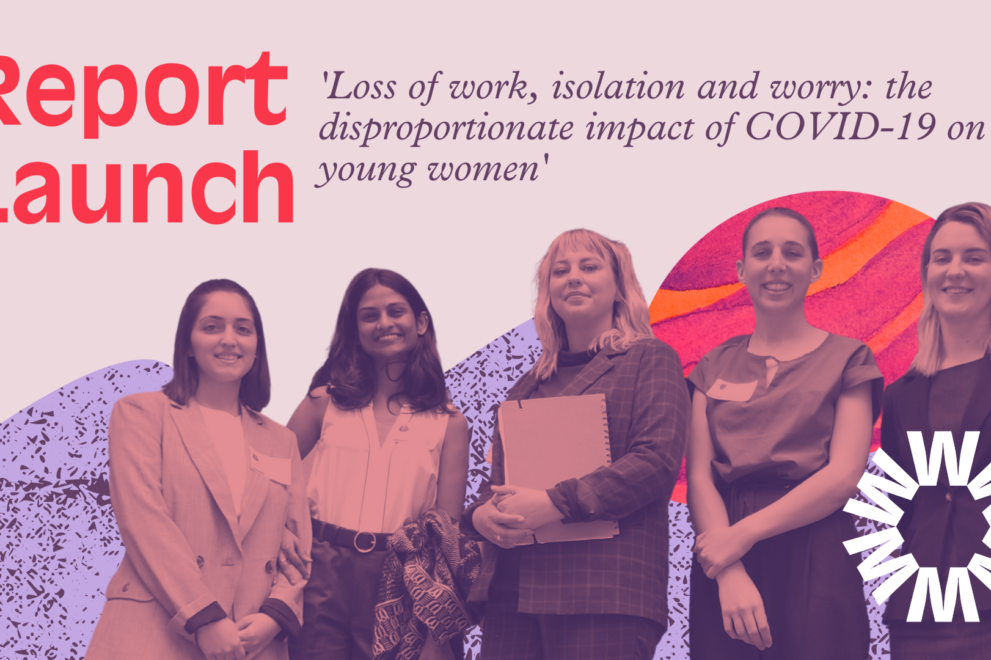
May Day (also known as International Workers Day or Labour Day) is a celebration of working people standing together for justice.
This year the Womens’ March4Justice movement will be part of the May Day celebrations to show solidarity with the union movement and to continue the fight for safer workplaces for women.
We acknowledge that this event is on Kaurna land and we pay our respect to the traditional custodians of the land, past and present . Sovereignty was never ceded.
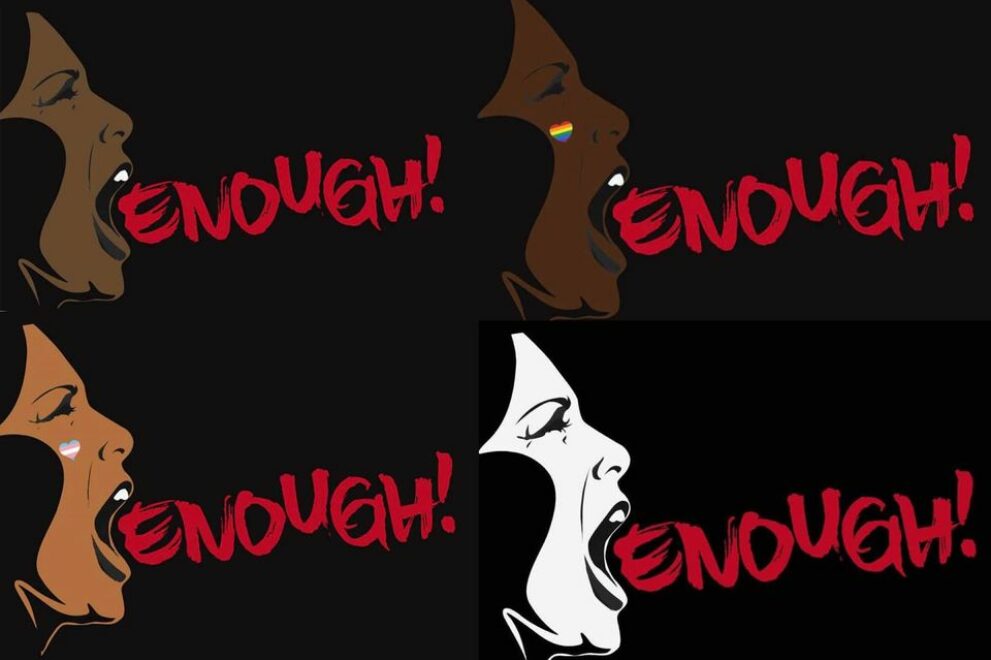
This material is designed and intended to provide general information in summary form on legal topics, current at the time of publication, for general informational purposes only. This is not legal advice.
October is sexual violence awareness month, and Reclaim the Night is a march that is traditionally held on the last Friday of October, to reclaim the streets so that women can walk at night without fear. This October, we gathered online to talk about reclaiming the workplace by ending sexual violence and harassment. We were joined by a panel of expert speakers to discuss what sexual harassment looks like, the extent of the problem in Australia, and what we can do to end sexual violence and harassment in our places of work and study.
Speakers:
Artwork by Cath Story. Find her art on Instagram @cathstorydraws
This webinar was streamed on Kaurna land. We pay our respect to the traditional custodians of the land, past, present and emerging. Sovereignty was never ceded.
This material is designed and intended to provide general information in summary form on legal topics, current at the time of publication, for general informational purposes only. This is not legal advice.
What is sexual harassment?
Sexual harassment is unwelcome sexual behaviour where the victim feels offended, intimidated or humiliated, and it is reasonable in the circumstances to feel that way.
It has nothing to do with mutual attraction or friendship. If there is consent, it is not sexual harassment.
Sexual harassment is against the law. You do not have to put up with it.
Sexual harassment can take many forms:
Can sexual harassment be a criminal offence?
Forms of sexual harassment which may constitute criminal offences include:
These actions can be reported to the police.
What are the effects of sexual harassment?
Informal ways of dealing with harassment:
Formal ways of dealing with harassment:
Useful tips to consider if you are being sexually harassed in your workplace:
How can the Working Women’s Centre Help?
We can:
We have further fact sheets on sexual harassment to help to inform you about your options.
Where else can I go for help?
Other organisations that may be able to help include your union, the Australian Human Rights Commission and the Equal Opportunity Commission.
If you are not already a member of a union, ring SA Unions on (08) 8279 2222 to find out which union to join.
Australian Human Rights Commission: The Respect@Work Portal has many resources for both employees and employers. Phone: 1300 369 711 Web: www.humanrights.gov.au
Equal Opportunity Commission: Phone: (08) 8207 1977 Web: www.eoc.sa.gov.au
Making a Sexual Harassment complaint is a serious matter.
Other service providers
If your life or someone else’s life is in immediate danger, phone 000 (triple zero).
This material is designed and intended to provide general information in summary form on legal topics, current at the time of publication, for general informational purposes only. This is not legal advice.
We often think about Workers Compensation claims as being claims for physical injuries. A construction worker with bad knees might spring to mind, a worker who types all day might have a compensable repetitive strain injury (RSI)condition or a landscaper might have a bad back.
It is important to remember that the South Australian workers compensation system (administered by an independent entity known as Return to Work SA) can also assist you if you are suffering from a psychological injury caused by sexual harassment in the workplace.
The South Australian workers compensation system is a no fault system. This means that you can be compensated for your injury regardless of whose fault it is. It can however be a long and traumatic process and we do encourage you to seek out support while you make a claim.
What is Sexual Harassment?
The Sex Discrimination Act 1984 defines sexual harassment as:
(1) A person sexually harasses another person (the person harassed ) if:
(a) the person makes an unwelcome sexual advance, or an unwelcome request for sexual favours, to the person harassed; or
(b) engages in other unwelcome conduct of a sexual nature in relation to the person harassed;
in circumstances in which a reasonable person, having regard to all the circumstances, would have anticipated the possibility that the person harassed would be offended, humiliated or intimidated.
Examples of sexual harrassment in the workplace
Sexual Harassment in the Workplace
Sexual harassment in the workplace continues to occur at unacceptable levels within Australian workplaces.
The latest Australian Human Rights Commission workplace sexual harassment survey, released in November 2022, has found that 1 in 3 workers had been sexually harassed at work in the previous five years.[1] This statistic has not changed since the previous survey in 2018.
In the 2017/2018 financial year, sexual harassment complaints to the South Australian Equal Opportunity Commission (EOC) were the second most prevalent. The 2017/2018 complaints were predominately from women but the Commission saw an increase in complaints from men too.
In 2016, the EOC was commissioned to deliver a report into sex discrimination and sexual harassment in the South Australian Police (SAPOL). In that report, the EOC found that 21% of women and 8% of men have experienced sexual harassment in the previous 5 years.
In December 2018, the Australian Council for Trade Unions (ACTU) released the findings from their 2018 survey into sexual harassment which found that 64% of women who responded to the survey had personally experienced sexual harassment in the workplace on one or more occasions. The survey also showed that 41.2% of those who had experienced sexual harassment did not disclose the sexual harassment to anyone. The ACTU survey elicited 9600 responses, a feat most statisticians wouldn’t sneeze at.
We could provide further statistics, at a local and international level but there is no need. It is well established that sexual harassment in the workplace is prevalent, has serious consequences for victims and workplaces, and seriously limits women’s equal participation in the workforce. This is why Sex Discrimination Commissioner, Kate Jenkins, led an enquiry into sexual harassment in the workplace and made 55 recommendations in the Respect @ Work Report.[2]
[1] The results of that survey can be found here: https://humanrights.gov.au/time-for-respect-2022
[2] Respect at Work: Sexual Harassment National Inquiry Report (2020) can be found online: https://humanrights.gov.au/our-work/sex-discrimination/publications/respectwork-sexualharassment-national-inquiry-report-2020#Za70h
Has sexual harassment caused you to suffer a psychiatric injury?
The Return to Work Act 2014[3] (the law that underpins the SA workers compensation system) defines injury as either a physical or mental injury. A mental injury is described in the Return to Work Act 2014 as a psychiatric injury and this means an injury that is ‘pure mental harm.’
To be eligible for worker’s compensation, work needs to have been the significant contributing cause of the mental injury.
[3] Return to Work Act 2014 section 4.
Case study
Julie works as an administrative assistant at a busy real estate agency. Julie works with all of the real-estate agents but spends most of her time assisting Graham, the owner of the agency. At first, Julie really enjoyed working with Graham. Graham was kind and took time to explain things to her when she wasn’t sure. After 6 months of work, Graham began emailing Julie and asking her about her weekend and other personal questions. Julie would tell Graham that she had a nice weekend and would give general details about her life. Julie wasn’t too worried about these questions but did think it was strange that Graham had such an interest her life. Graham would also regularly ask Julie about her boyfriend and details about their relationship. Julie began to feel uncomfortable but didn’t feel as though she could say anything. One night, Julie stayed back on a Friday night to have work drinks with her colleagues. At the end of the night, Graham asked Julie whether she enjoys having sex with her boyfriend. Graham then grabbed Julie’s breasts and tried to kiss her. Julie froze and tried to pull away. Julie left the party and Graham sent her explicit text messages. Julie was too scared to go to work on Monday and thought about just quitting. Julie wasn’t sleeping or eating and she was having panic attacks when she thought about having to see Graham. Julie decided to see her doctor. Julie’s doctor diagnosed her with depression and anxiety.
Julie’s depression and anxiety was caused by her work and this injury could be classified as a psychiatric injury for the purposes of lodging a workers compensation claim.
Let’s break down what ‘psychiatric injury’ means
In the Working Women’s Centre’s experience, psychiatric injuries often include depression disorders, post-traumatic stress syndrome, anxiety disorders and adjustment disorders.
All of these disorders have a range of symptoms including but not limited to feeling sad, moody, low, hopeless, nervous and feeling elevated stress or worry. Sometimes in a sea of feelings it is also hard to pinpoint what you’re feeling and that’s okay. Beyond Blue have provided a helpful checklist to help you navigate your way through this.
Here is a link:
There are many reasons why you might be suffering a psychiatric injury, this fact sheet deals with psychiatric injuries caused by sexual harassment in the workplace.
It doesn’t take a rocket scientist to understand that if you’re suffering from a psychiatric illness, it is may affect your work. In many cases, a psychiatric illness might manifest in high absenteeism (sick days), effect productivity, or effect your ability to cope with your workload and workmates.
Like any work injury, our community recognises that if your psychiatric injury has been caused by work then you may need time off to recover, receive medical attention and consider rehabilitation options. This is why we have a worker’s compensation system to help workers recover and rehabilitate. If your psychiatric injury has been caused by sexual harassment in the workplace and it has caused you to require medical attention or time off work, then you should seriously consider making a worker’s compensation claim. If you broke your arm at work, would you think twice about making a claim? Probably not! Psychiatric injuries are just as legitimate and therefore just as compensable!
How to make a worker’s compensation claim? A step by step guide:
Interim Payments
[Section 32 of the Return to Work Act 2014]
You may be entitled to receive interim payments while you wait for your workers’ compensation claim to be processed. If you have waited more than 10 days for your claim to be determined you must be offered interim payments. It is important to note that if your claim is rejected you may need to pay this money back. The agency will need to recover payments via debt recovery, [section 201] and it is unlikely that this will occur.
The debt recovery process occurs in the Magistrates Court of South Australia, for debts less than $100,000.00 and in the District Court of South Australia for debts exceeding $100,000.00. If the claim is for $12,000 and under the claim will be considered a minor civil claim. At the minor civil claims stage, you cannot be represented by a lawyer.
Recent changes to workers compensation in South Australia do not affect claims relating to psychological injury.
What if the sexual harassment has aggravated my pre-existing mental health issue? Can I still make a claim?
If you have been suffering from a mental health condition and the sexual harassment in the workplace has aggravated the injury, you still may be entitled to workers compensation for the aggravation. That is because the Return Work Act 2014 defines an injury that includes an injury that is, or results from, the aggravation, acceleration, exacerbation, deterioration or recurrence of a prior injury.[4]
[4] Return To Work Act 2014 section 4.
Important Extras to Remember
The Australian Human Rights Commission has launched Speaking from Experience, a
landmark project that centres the voices of people with lived experience in workplace
sexual harassment reform.
Sexual harassment is still unacceptably prevalent in Australian workplaces, with one in
three people having experienced workplace sexual harassment in Australia in the last
five years. The Commission is inviting people who have been sexually harassed at work
to have their say about what they think needs to change to make workplaces safer. The
information gathered will help create resources that will help workers and employers
know how to make workplaces safer for everyone, as well as inform future law reform
priorities.
Through a user-friendly web portal hosted on the Commission website, people who
have been sexually harassed at work can submit written or audio submissions outlining
their recommendations on what needs to change to address workplace sexual
harassment.
Participation in the project is voluntary and open to all individuals in Australia.
You can view and share the web portal here: https://humanrights.gov.au/our-work/sex
discrimination/speaking-experience
In addition to the online submissions, the Commission will conduct in-person
consultations across Australia to ensure the voices of marginalised groups are heard.
The consultations will prioritise input from Aboriginal and Torres Strait Islander
workers, young people, culturally and racially marginalised workers, people with
disability, LGBTIQ+ workers, and other groups disproportionately targeted by
perpetrators of workplace sexual harassment.
If you would like to be a community partner for the in-person consultations, please read
the flyer attached and email speakingfromexperience@humanrights.gov.au

In a show of support and solidarity, the Working Women’s Centre attended the Bread and Roses / Bret Mo Roses album launch, spotlighting the courageous battle of a group of 12 migrant women, members of the United Workers Union, who are fighting back after surviving sexual violence in the glasshouses of Perfection Fresh company.
These women, known as the Perfection 12, have bravely taken their fight to the Federal Court of Australia, seeking accountability and systemic change at Perfection Fresh, a major supplier to Coles and Woolworths, for failing to provide a safe workplace for its employees, particularly women who endure sexual harassment and assault within its glasshouses.
The Bread and Roses album, featuring the voices and stories of the 12 migrant women union members, marks a significant moment in the ongoing struggle, particularly highlighting the sacrifices that seasonal workers make for their families and their isolation from their communities for years, as well as their pursuit for justice and safety in the workplace. The title track, Bread and Roses (Bret Mo Roses) is an old union song that has been adapted by the women to reflect their own fight for respect.

During her speech at the Semaphore Workers Club event, Caterina Cinanni, executive director of the United Workers Union, emphasised the urgency of their fight for change. “The Perfection 12 are brave women fighting for justice, respect, and safety not just for themselves, but for every single woman working in that glasshouse. Perfection Fresh is the wealthiest and largest tomato glasshouse corporation in Australia.”
Abbey Kendall, director of Working Women’s Centre, underscored the importance of safe workplaces for all workers “Seasonal work must be safe, regardless of their background, identity, or job type. That is the benchmark of Australian workplace laws,” she added.
As the Perfection 12 continue their legal battle, supporters can amplify their message by spreading awareness and advocating for accountability from companies like Perfection Fresh. The Bread and Roses album serves as a testament to their resilience and determination, inspiring solidarity, and action among all who seek justice in the workplace.
For more information on how to support the Perfection 12 and their campaign, visit Bread and Roses – Full Album – Rotten Perfection

SA Attorney-General Kyam Maher visited the Centre on Wednesday 10 August 2022 to announce that $2 million in funding will be given to the Centre, over the next three years, to aid our work in combatting sexual harassment in the workplace.
He said the funding was “really important”.
“Many women don’t just suffer sexual harassment at work, there’s often underpayment of wages so it’s critically important that women have a resource like the Working Women’s Centre,” he said.
The ABC interviewed our Director Abbey Kendall, as well as Senior Lawyer Emma Johnson and her client, Tessa Jones* who spoke about her experience of sexual harassment at her former workplace, and how the Centre helped her.
“For me, I had to go through this, I couldn’t go around it, I couldn’t ignore it. I had to go straight through it and the Centre helped me do that,” she said.
The funding aligns with Recommendation 53 of federal Sex Discrimination Commissioner Kate Jenkins’ Respect@Work report. The Centre will use the funding to employ more lawyers.
The story was also featured on the ABC News SA 7pm bulletin.
*Name changed
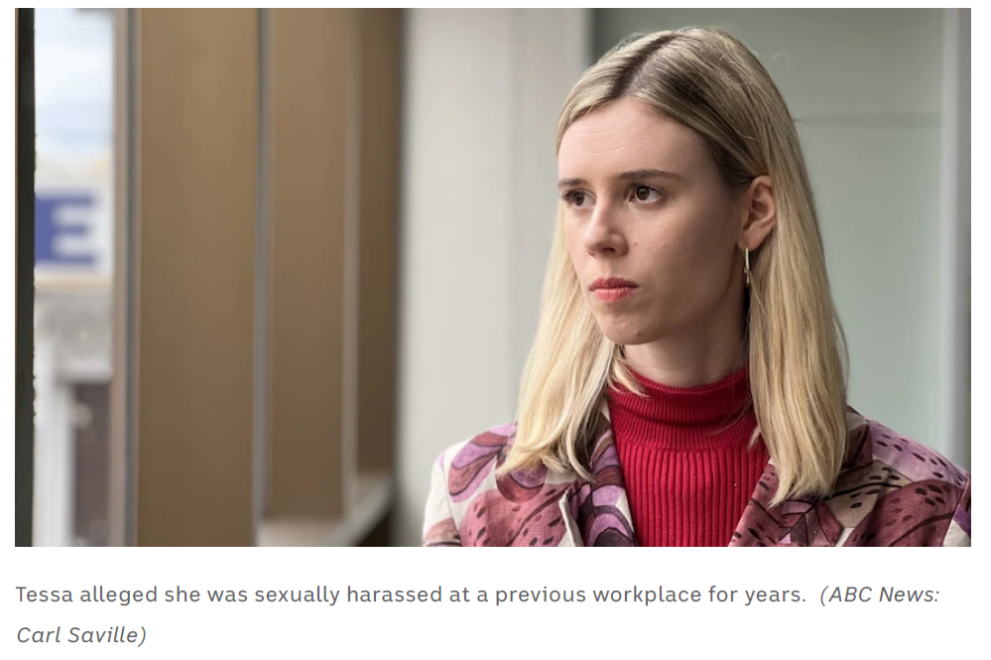
If you are an employer or organisational leader, or you work in HR, get in touch with us about how you can get involved with our project about gendered violence and insecure work.
Our Director Abbey Kendall spoke with Kathryn Bermingham, for the Advertiser on September 22, 2021.
Abbey Kendall, director of the Working Women’s Centre of SA, said there are clear steps employers can take to ensure Christmas parties are safe.
“Prior to a Christmas party, an employer really needs to look at the culture within an organisation or business,” she said.
“If there is, that needs to be addressed before the party … the emphasis really needs to be on prevention.”
Ms Kendall said complaints arising from Christmas parties made January was a particularly busy time for the centre.
“The complaints range from lewd comments at the Christmas party bar right through to serious assaults,” she said.

WHEN
05 Oct 2021
6pm – 7.30pm
EVENT TYPE
Live panel
WHERE
Say Kitchen Café, 78 Currie Street, Adelaide
ACCESSIBILITY
Wheelchair Accessibility

The Morrison Government has been accused of ignoring another recommendation of the landmark Respect at Work report.
Working Women’s Centres were singled out by Sex Discrimination Commissioner Kate Jenkins as an essential service for providing support for victim-survivors of sexual harassment, but the future of two centres – in the Northern Territory and Queensland – is in doubt.
Featured:
Emma Sharp
Nicki Petrou, Director, NT Working Women’s Centre
Abbey Kendall, Director, SA Working Women’s Centre
Helen Campbell, Executive Officer, NSW Women’s Legal Service
Reporter:
Cathy Van Extel
Duration: 7min 54sec

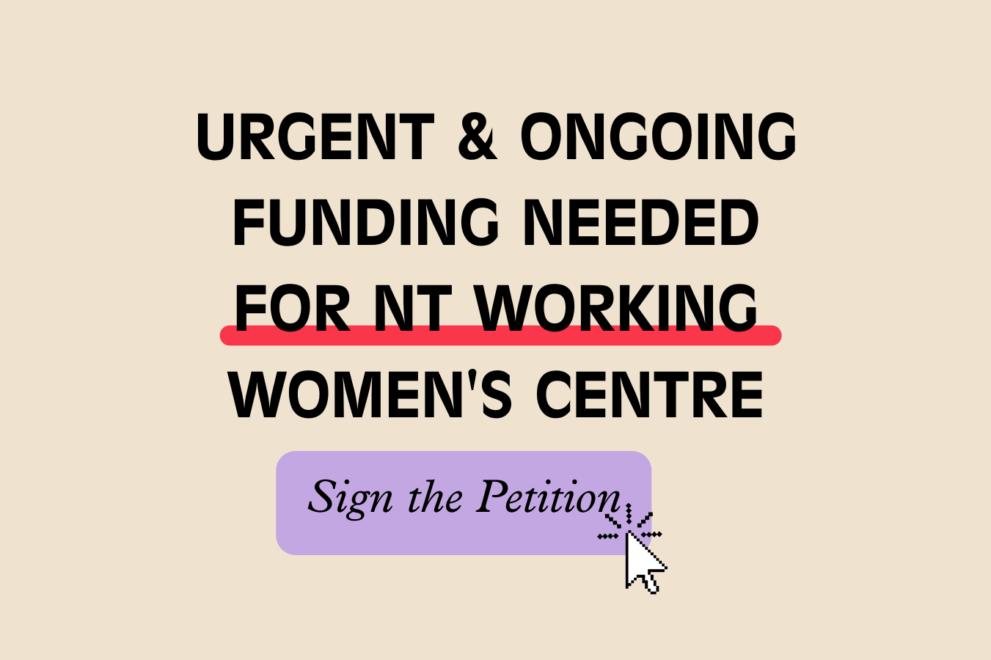
Appointments will be held at the Legal Advice Clinic – City West Campus on:
To make an appointment please telephone WWC SA on 8410 6499 or complete the online form at:

We are looking for a small team of volunteer Fundraising Ambarassors! The fundraising ambassadors will drive our fundraising efforts to help us reach our fundraising goal ($50,000 over the next 12 months). You will organise community engagement activities to help us fundraise and build our community of supporters. This will include helping to organise a large fundraiser event in April or May of 2022.
![]() Are available to attend our Fundraising Ambassador Info Night at 29 SEP, 5:30 PM – 7:30 PM
Are available to attend our Fundraising Ambassador Info Night at 29 SEP, 5:30 PM – 7:30 PM
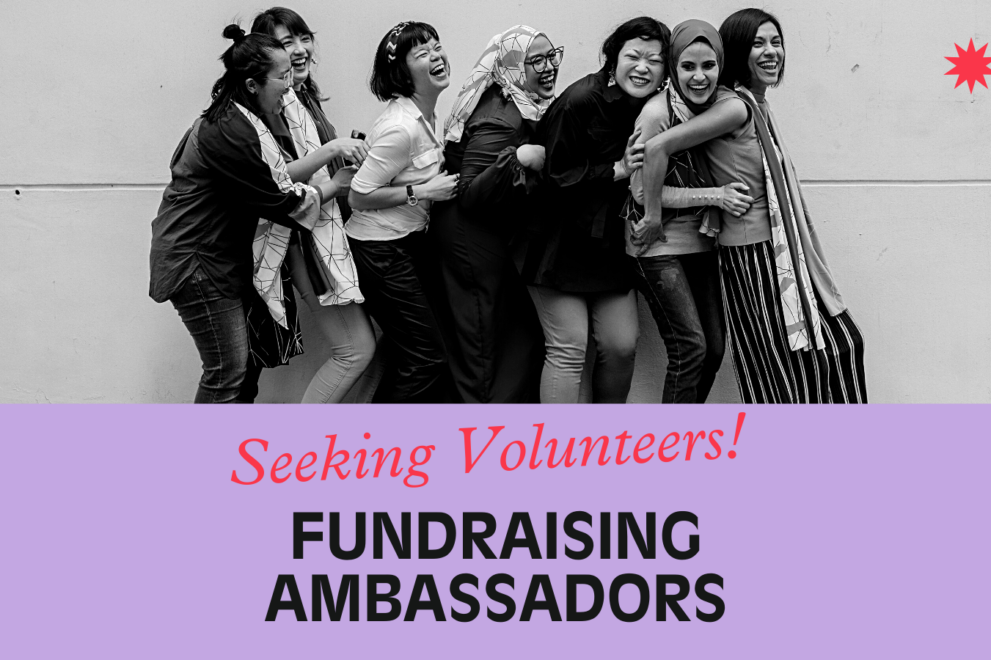
Watch online here:
The recordings and transcripts of the event will be available after the summit.

“We don’t want a culture where we expect the onus to be on the victim or survivor and therefore make women take the first step and react to sexual harassment, as opposed to stopping it from happening in the first place,” says Kendall.”
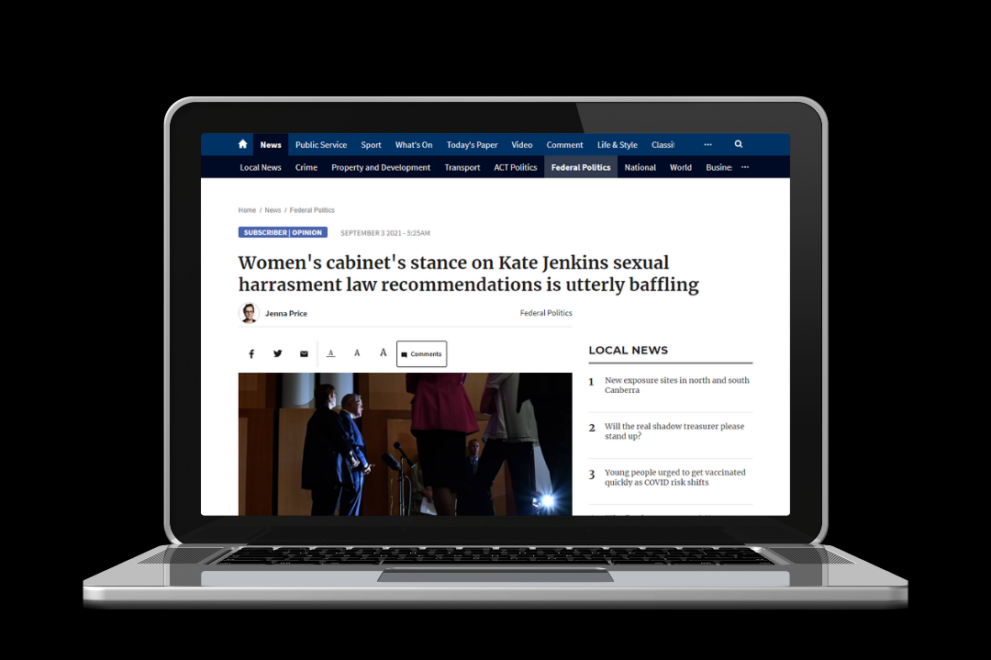
The South Australian, Northern Territory, and Queensland Working Women’s Centres welcome Labor’s promise to ensure there are properly funded Working Women’s Centres in every Australian state and territory.
With this announcement, Labor has recognised that Working Women’s Centre’s service models are crucial to addressing the pervasive issue of sexual harassment in Australian workplaces.
All corners of the country are calling on the federal government to address sexual harassment in the workplace.
Recommendation 49 of the Australian Human Rights Commission’s Respect@Work Report is that ‘Australian governments provide increased and recurrent funding to working women’s centres to provide information, advice, and assistance to vulnerable workers who experience sexual harassment. The Sex Discrimination Commissioner recognised the unique holistic support provided by Working Women’s Centres:
“We found they were uniquely the most effective, victim-centric model that could deliver support, advice [and] advocacy to women [across a] range of issues in their work.”
The federal government accepted this recommendation. Now is the time for the government to make a concrete funding announcement.
Working Women’s Centres call for bipartisan commitment to fully fund Working Women’s Centres. The prevention of sexual harassment should not be a political football. We need the federal government to immediately announce a funding package for the working women’s centres. The Northern Territory Working Women’s Centre is just months away from closing.
Two out of five Australian women experienced sexual harassment at work in the past five years, but the Federal Government has failed to properly fund the Working Women’s Centres that provide the first point of contact for women experiencing sexual harassment in the workplace.
All three centres have seen an exponential increase in enquiries about sexual harassment. The South Australian Working Women’s Centre has seen a 200% increase in enquiries since March 2021.
Quotes attributable to Nicki Petrou, Director NT Working Women’s Centre:
“With our one-off interim Federal funding running out in September, and without a further funding commitment from the Federal government, we will have to close the NT Working Women’s Centre by the end of the year. We will need to tell Territory women that we will no longer be there when things go wrong in the workplace, when they need our support.
We do not want to see Territory women the casualties of a political funding battle especially when every minute counts for us right now. “
“The need for this funding is urgent: there has been a national outcry against workplace sexual harassment and assault that we know occurs in every industry. We cannot delay this. The NTWWC do not want to start turning women away especially when as a society we are now encouraging women to come forward and share their story, to say enough is enough but not provide the support that is needed!”
Quote attributable to Abbey Kendall, Director of SA Working Women’s Centre
“We have been fighting for funding recognition for the last 8 months and we welcome Labor’s pledge to sustainably fund Working Women’s Centres and ensure that all Australian women can have access to our world leading model of service, no matter where they work and live. Sexual harassment in the workplace should not be politicised.
“We need funding action from the federal government and bi-partisan support for our services. This is a no-brainer, the federal government have an opportunity to make their mark in the prevention of sexual harassment, and they can do it by funding a holistic, professional and trauma informed service that has a proven track record of improving the lives of Australian working women.”
Quotes attributable to Claire Moore, Acting Director of Basic Rights Queensland (Working Women’s Centre QLD)
“WWCs have proven our worth over many years. We support women to understand their rights and have access to the system to achieve outcomes when these rights have been violated. The struggle for effective funding has highlighted the unmet needs of women and the impact on their lives, their workplaces , and their families. The Respect@Work report acknowledged the need for these services as an integral element of the response to the systemic damage to women who are damaged by harassment, discrimination, and isolation. Their voices need to be heard.”
Save our Working Women’s Centres website: https://saveourworkingwomenscentres.com.au/

Read the full article on Refinery19
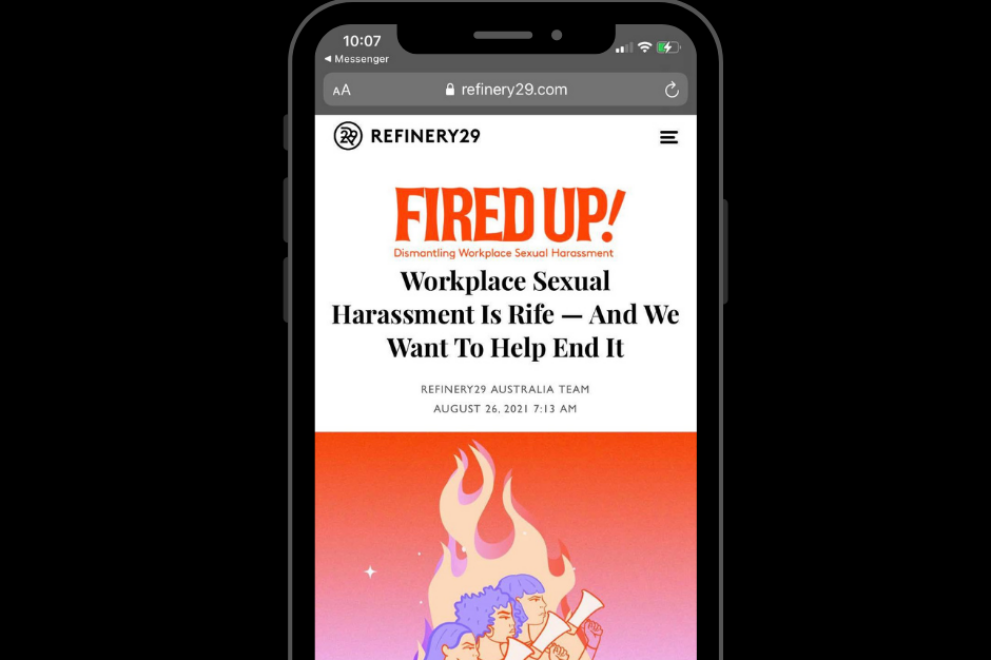
Read the full article on Refinery29 here
The Northern Territory Working Women’s Centre — a community-based non-profit organisation that supports women through gender discrimination, sexual harassment and assault in the workplace — is at risk of closure. Sign the petition to demand federal funding — it only takes 2 minutes! To read more about Refinery29 Australia’s long-term initiative to dismantle sexual harassment in the workplace, visit the #FiredUp hub.
“reclaim its position as leaders in tackling sexual harassment, provide employers with the guidance they need and victims the support and redress they deserve.”
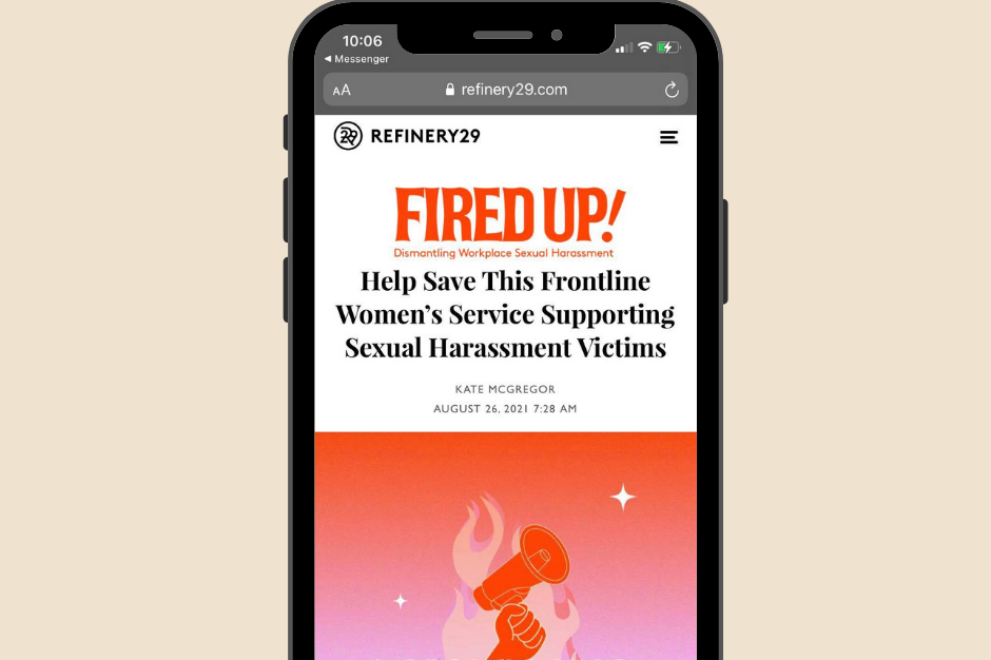
Read the full article on Refinery29 here
The Northern Territory Working Women’s Centre — a community-based non-profit organisation that supports women through gender discrimination, sexual harassment and assault in the workplace — is at risk of closure. Sign the petition to demand federal funding — it only takes 2 minutes! To read more about Refinery29 Australia’s long-term initiative to dismantle sexual harassment in the workplace, visit the #FiredUp hub.
Nicki Petrou, the director of the NTWWC, says the NT government gives the centre $200,000 a year, but another $700,000 annually is needed to keep it open. If the federal government doesn’t commit to this funding soon, she fears being forced to make staff cuts, reduce operating hours from five to three days a week in September, and potentially closing doors in November.
“[The funding] will be able to at least fund us properly, and to be able to respond appropriately to the demand,” Petrou told Refinery29 Australia.
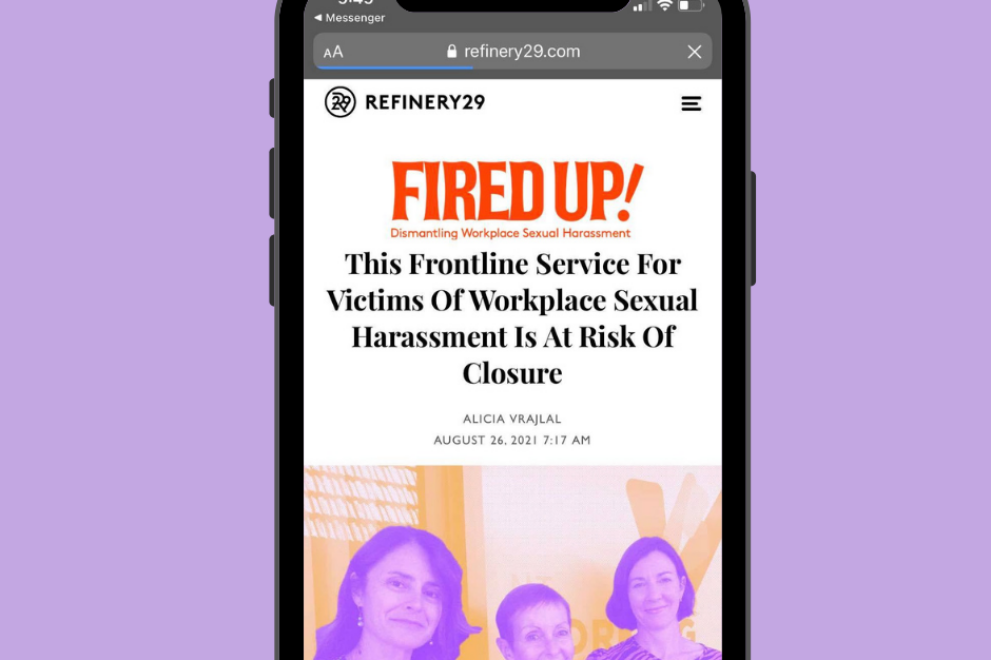
Read the full article on The Sydney Morning Herald here.
Specialist employment law centres that help women take action against underpayment and sexual harassment are warning they are at risk of closure as a decision on giving them permanent funding is delayed.
The federal government is still consulting states and territories over funding for the working women’s centres, which the landmark Respect@Work report from the national inquiry into sexual harassment in Australian workplaces recommended should be increased and made recurrent.
Standalone working women’s centres exist only in Queensland, South Australia and the Northern Territory. They are specialist workplace legal services that advise and represent women who aren’t union members and can’t afford private lawyers.
Sex Discrimination Commissioner Kate Jenkins recommended in the Respect@Work report that their funding should be boosted and similar services set up in the states that don’t have them.
“Our national inquiry found that support, advice and advocacy for victim-survivors of sexual harassment should be delivered through a multifaceted, holistic approach, including smooth and speedy referrals between services,”
she told The Age and The Sydney Morning Herald.
“Working women’s centres are well-placed to act as a central hub for this approach and address the intersectional needs of victim-survivors in a way that other services may be unable to.”
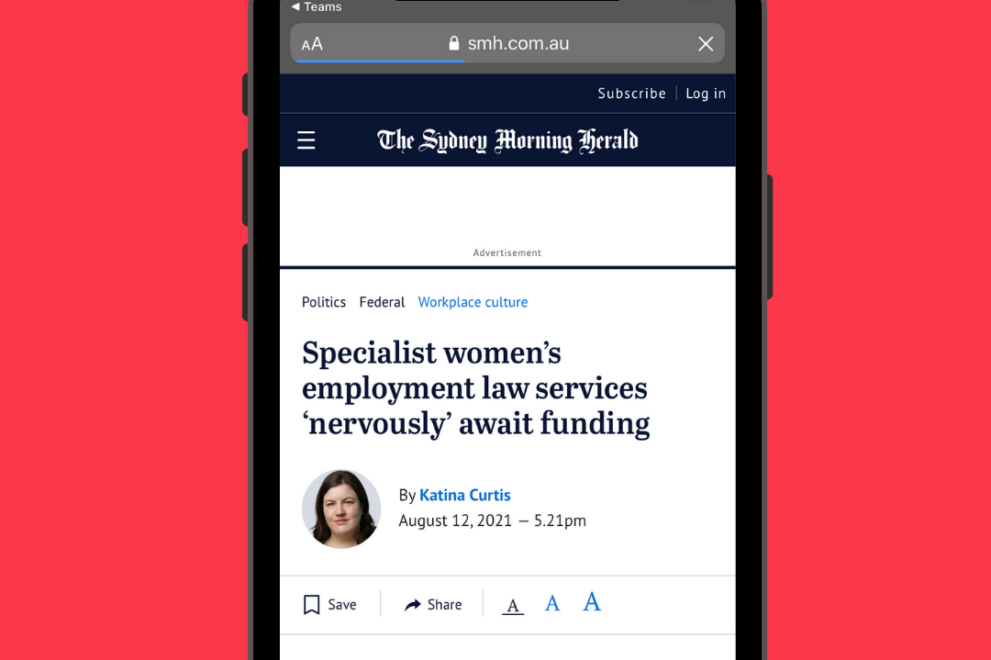
Registrations are open! Join our team & start fundraising for the Working Women’s Centre here:
https://citybay21.grassrootz.com/working-women-s-centre-sa

Have you experienced:
• Wage theft? Do you think you may not be being paid correctly?
• Unfair dismissal? Have you been dismissed from a job recently?
• Discrimination? Have you been treated badly at work due to race, gender or age?
• Sexual harassment?
• Bullying?
• Sham contracting? Does your employer call you a contractor, however you may be an employee?
